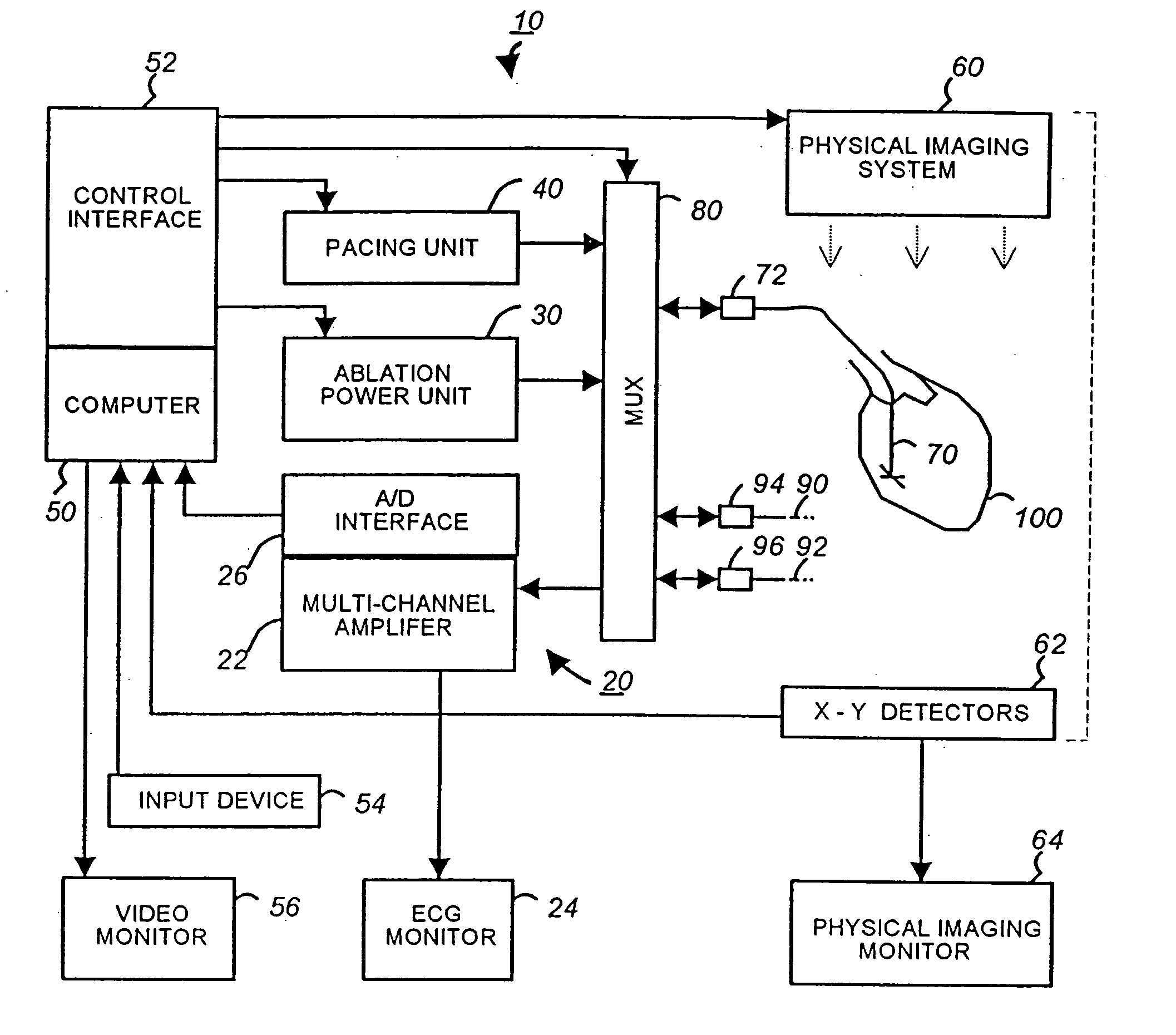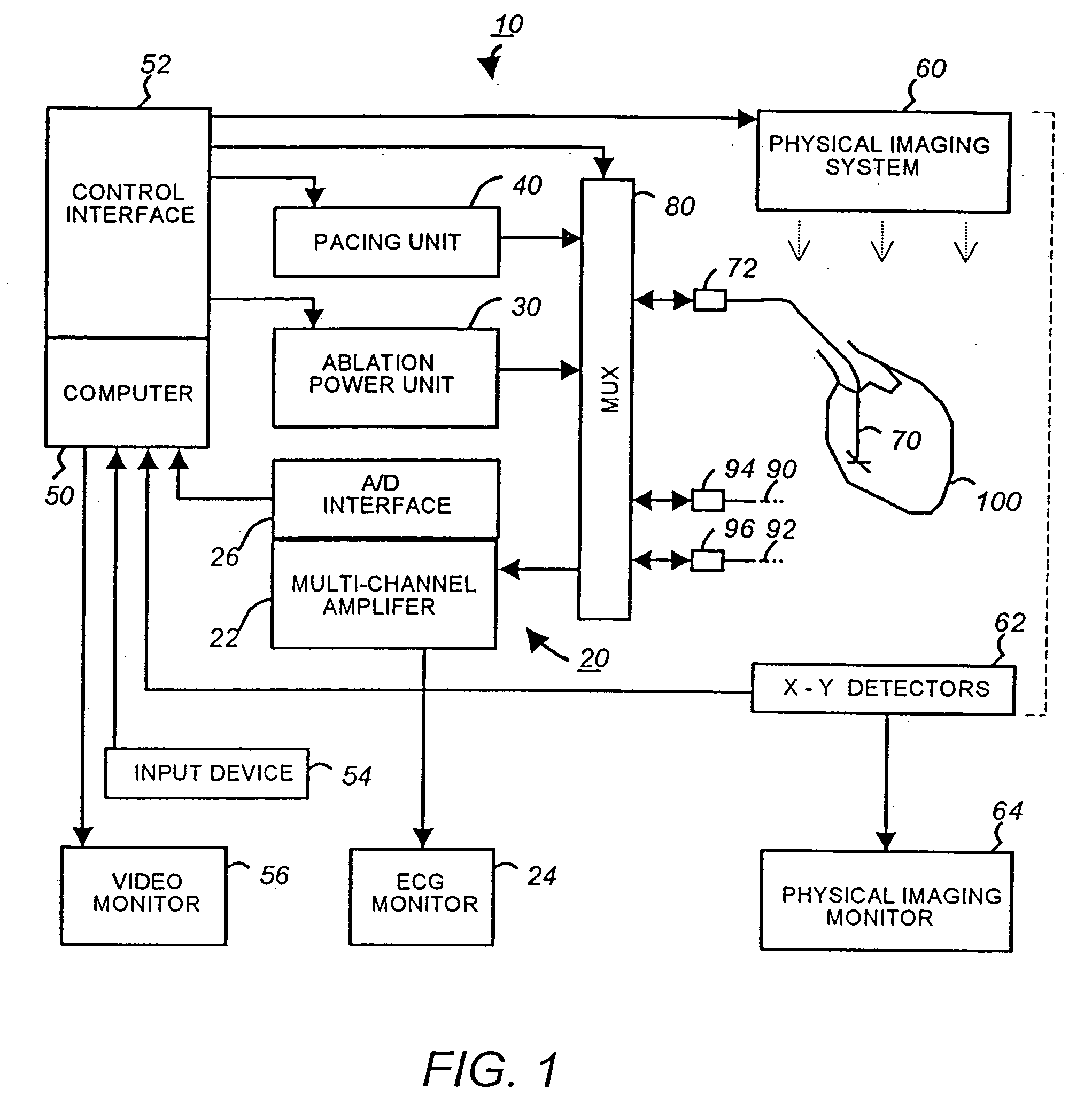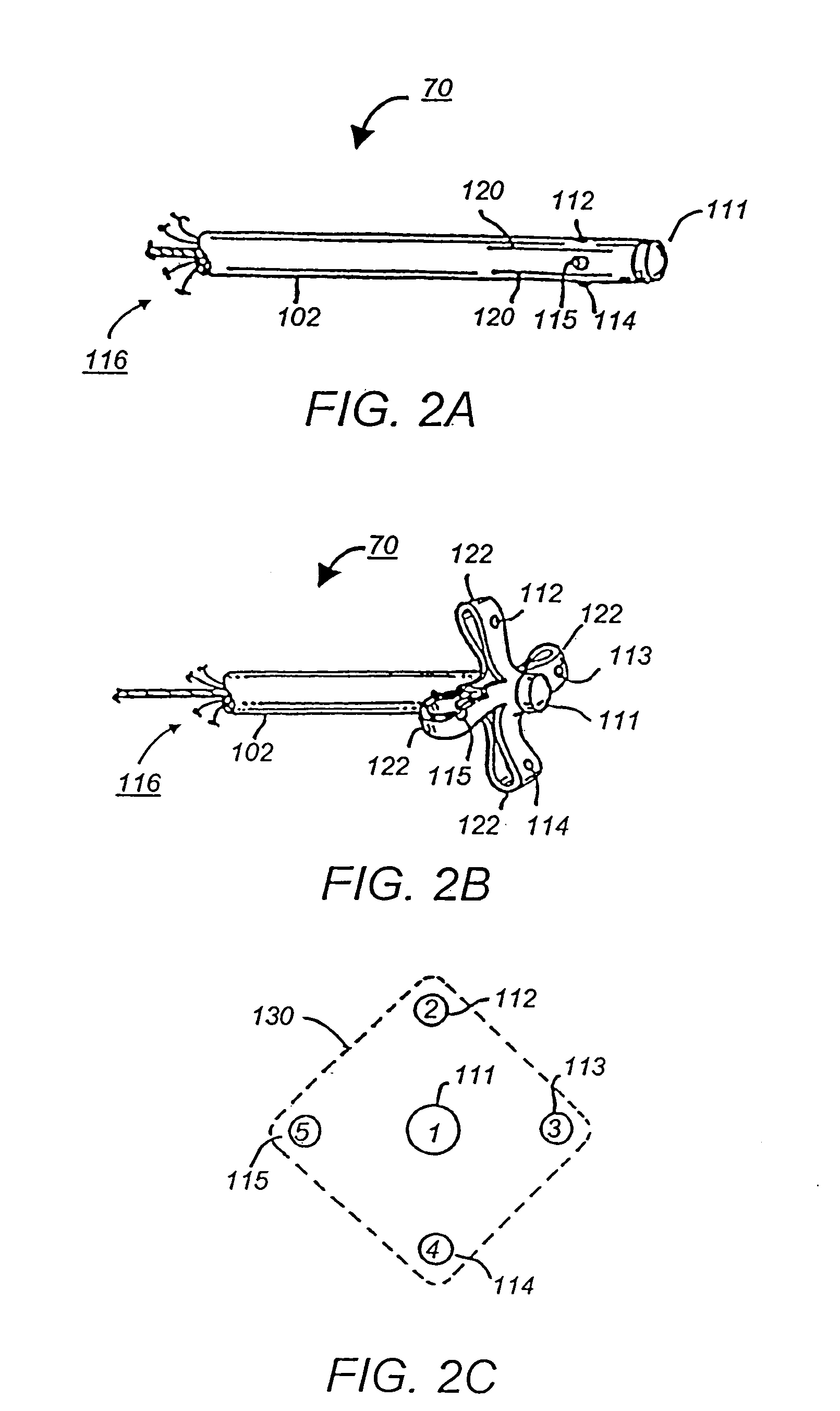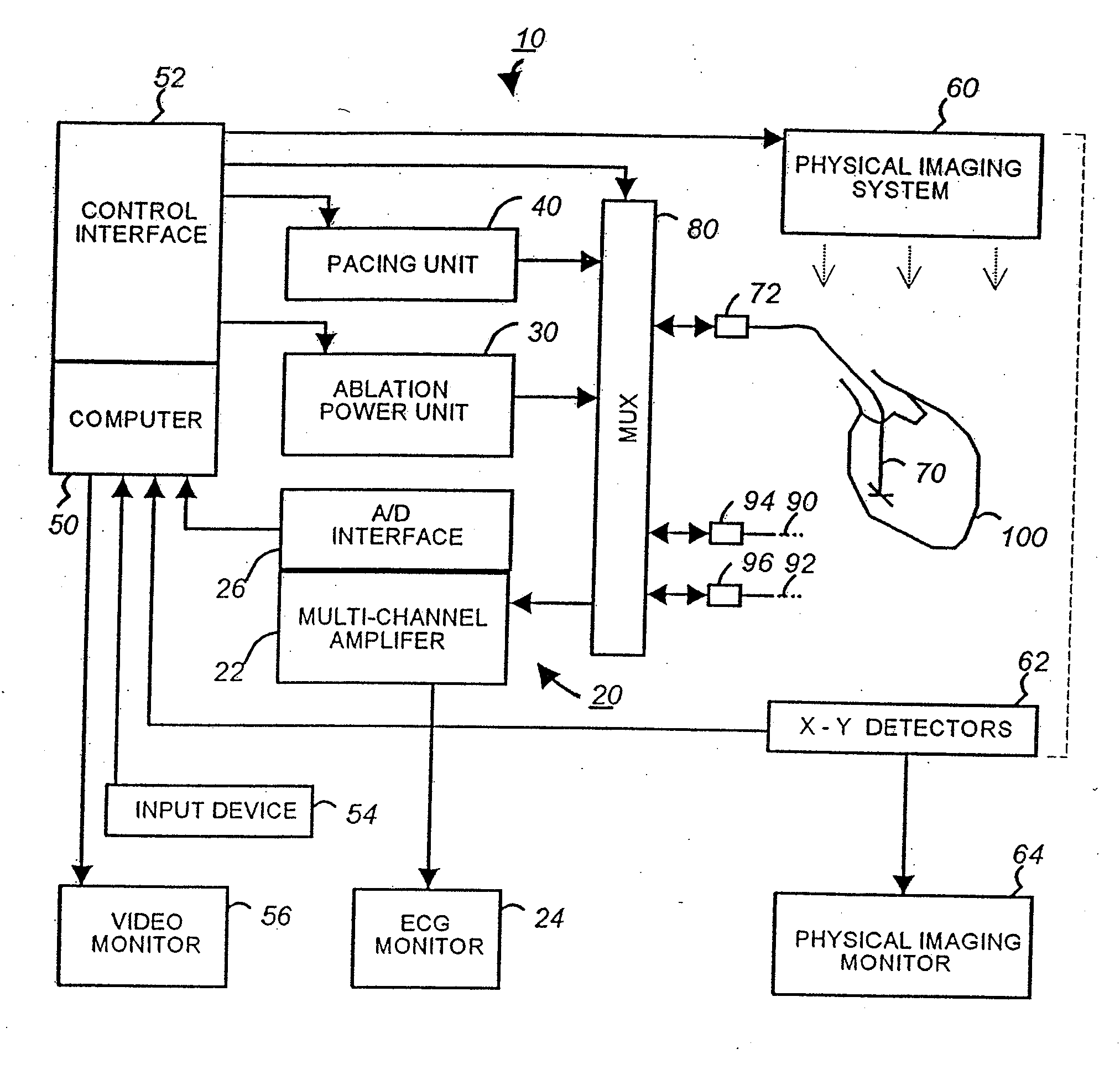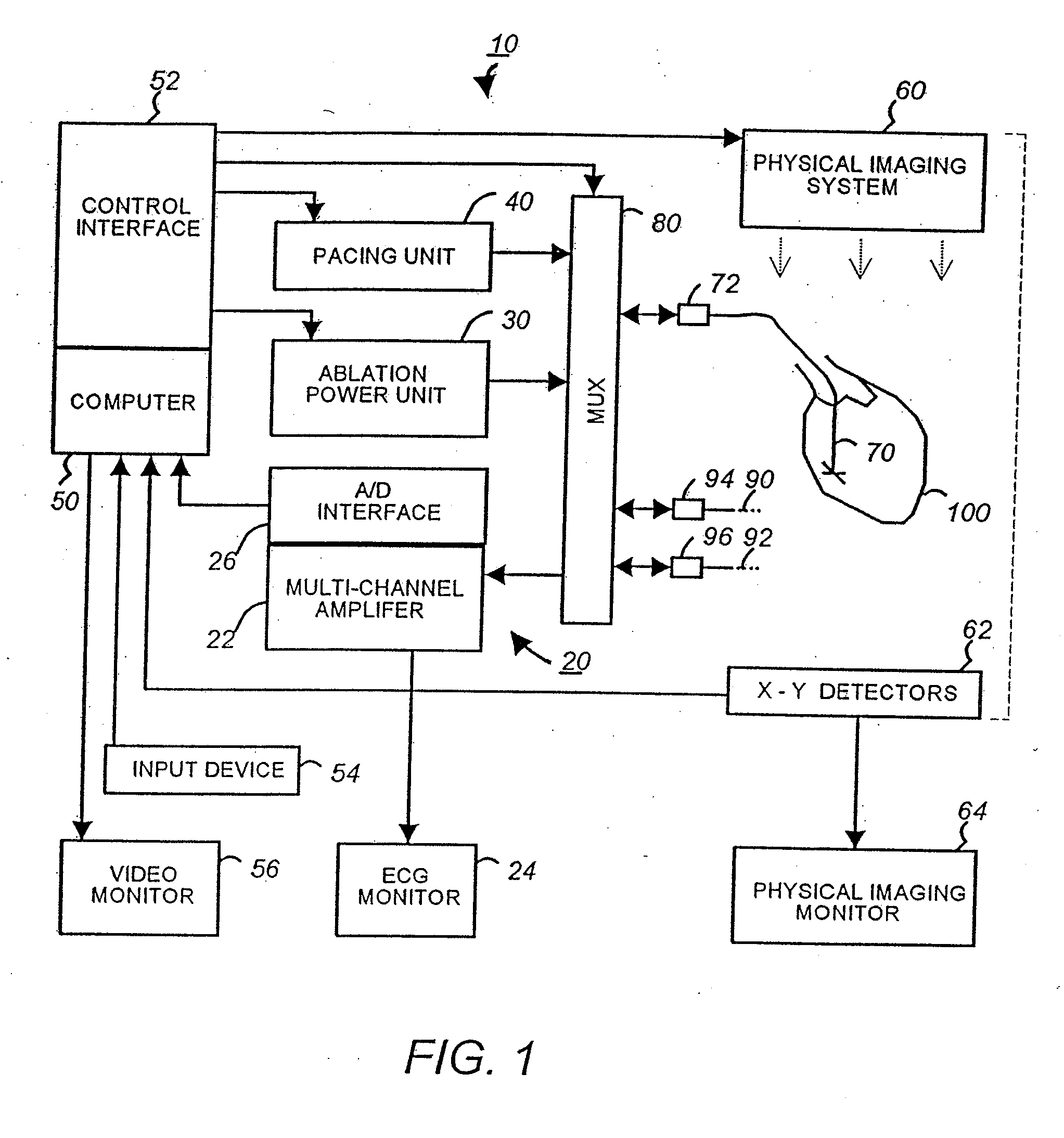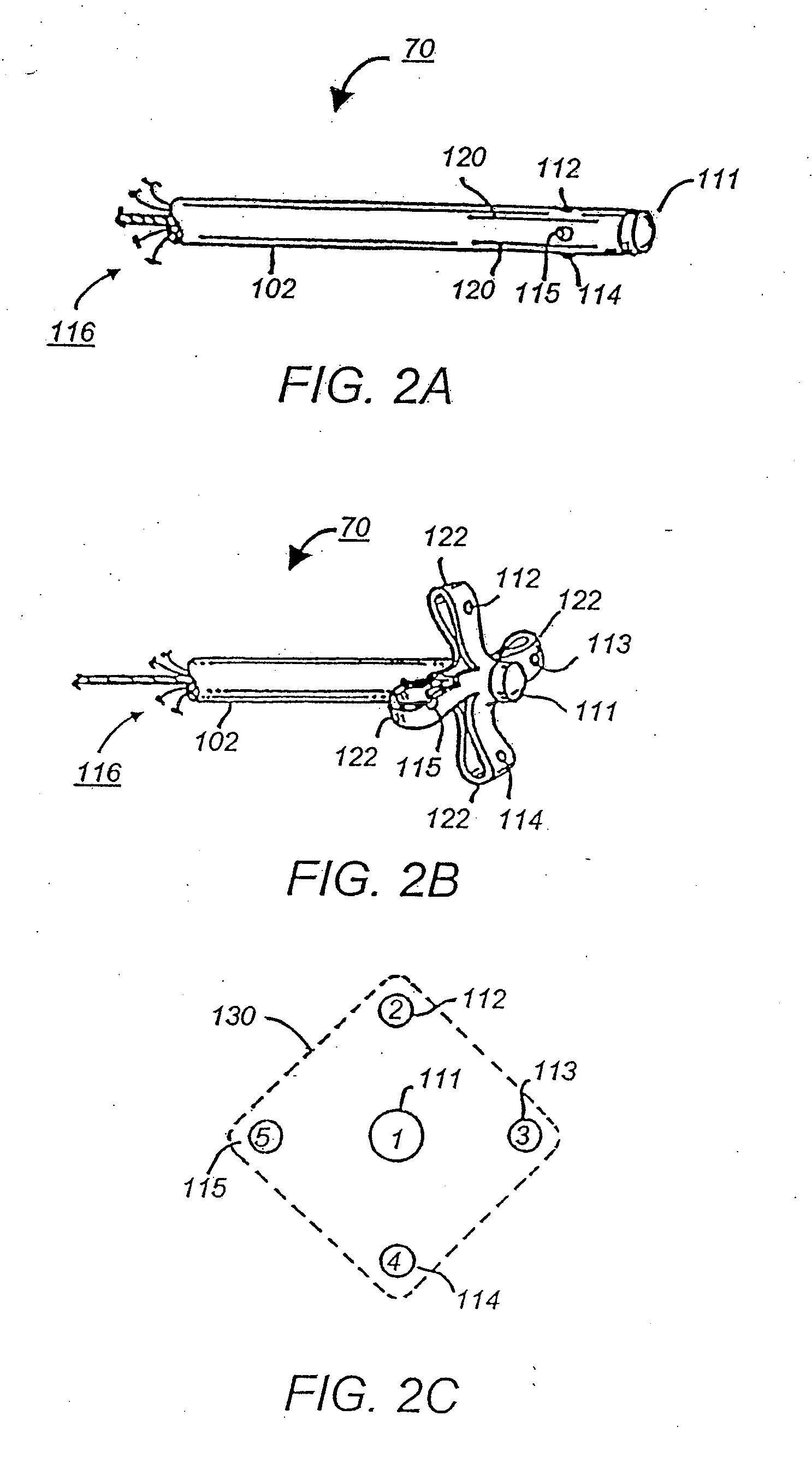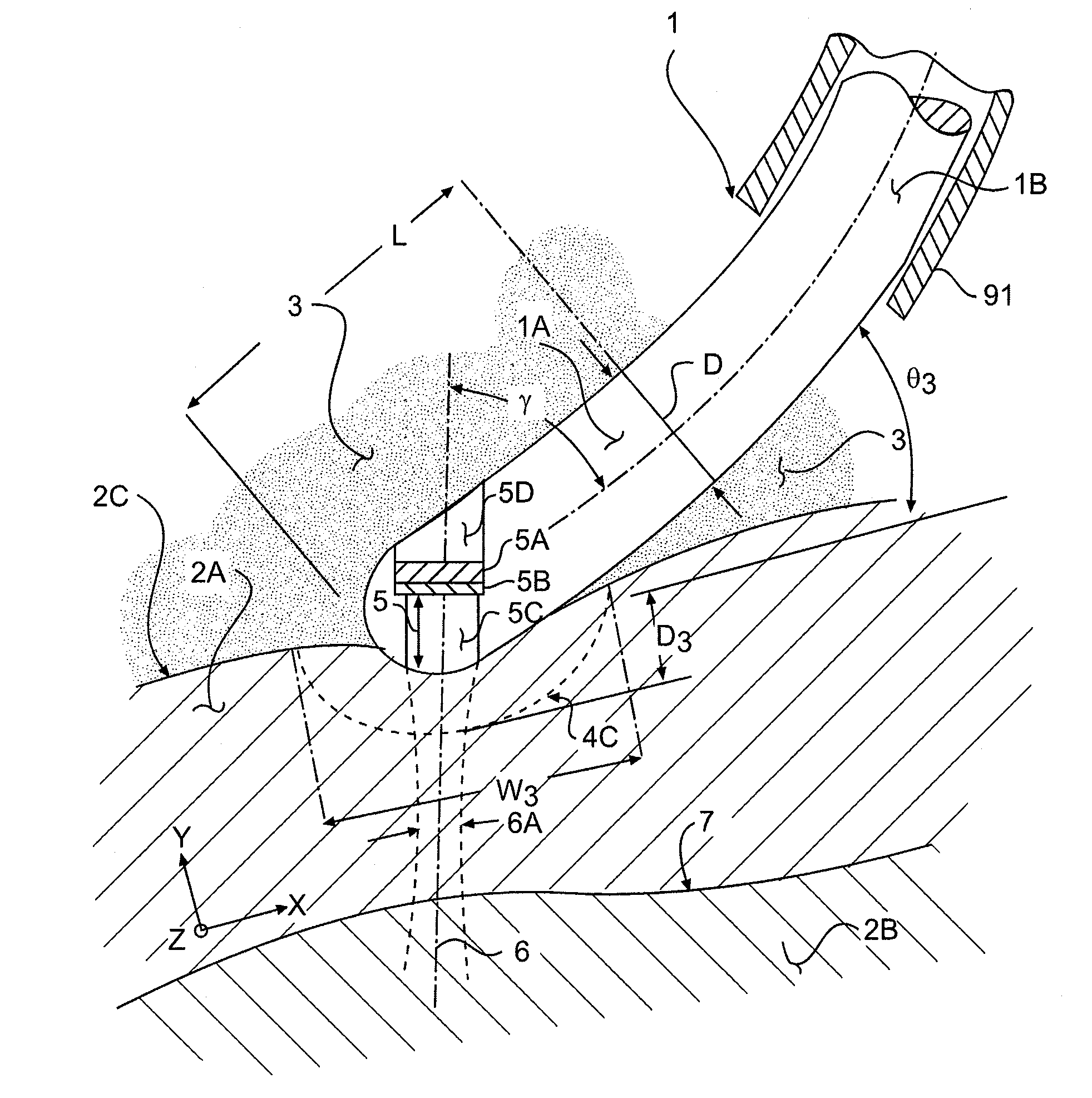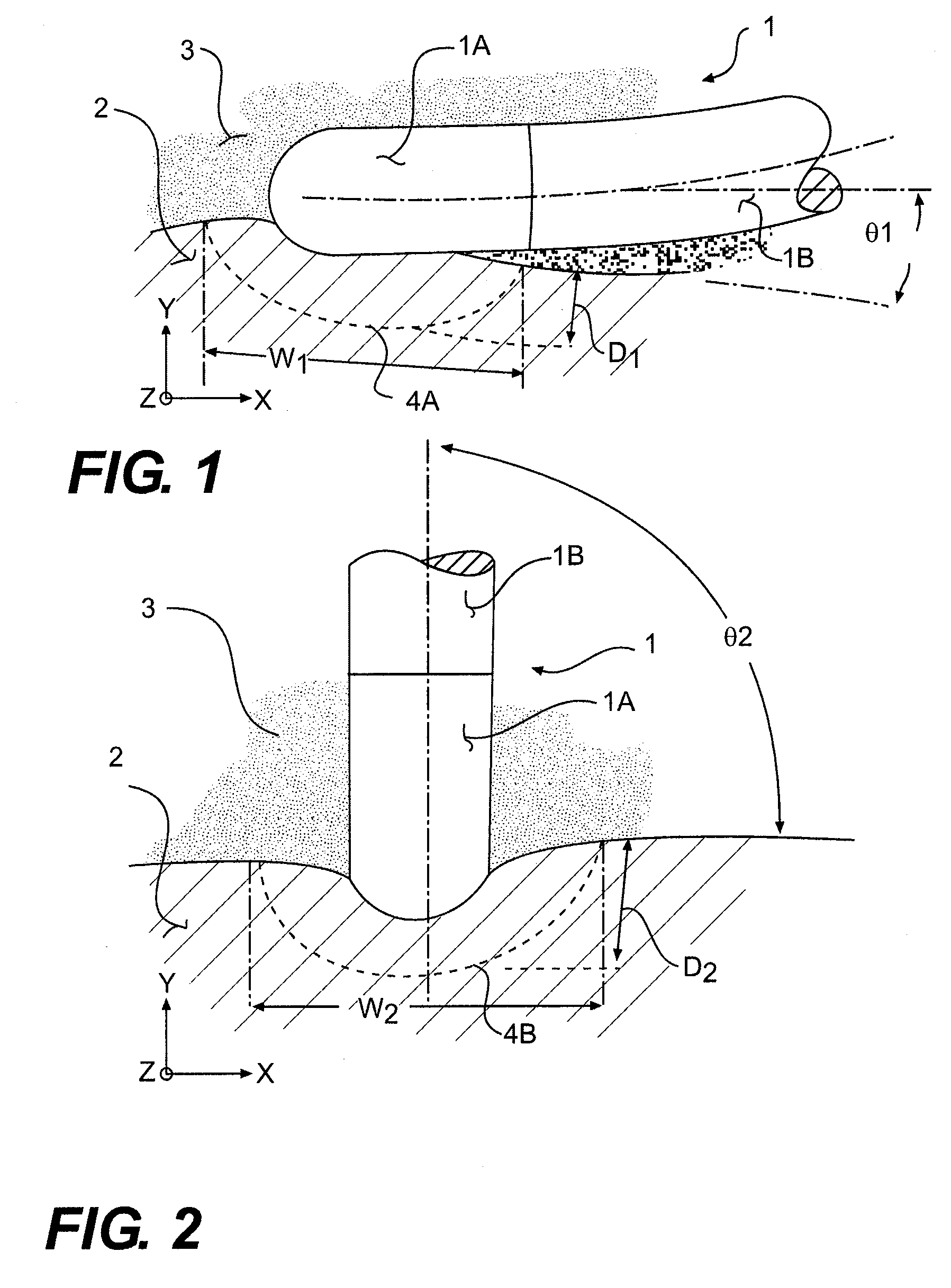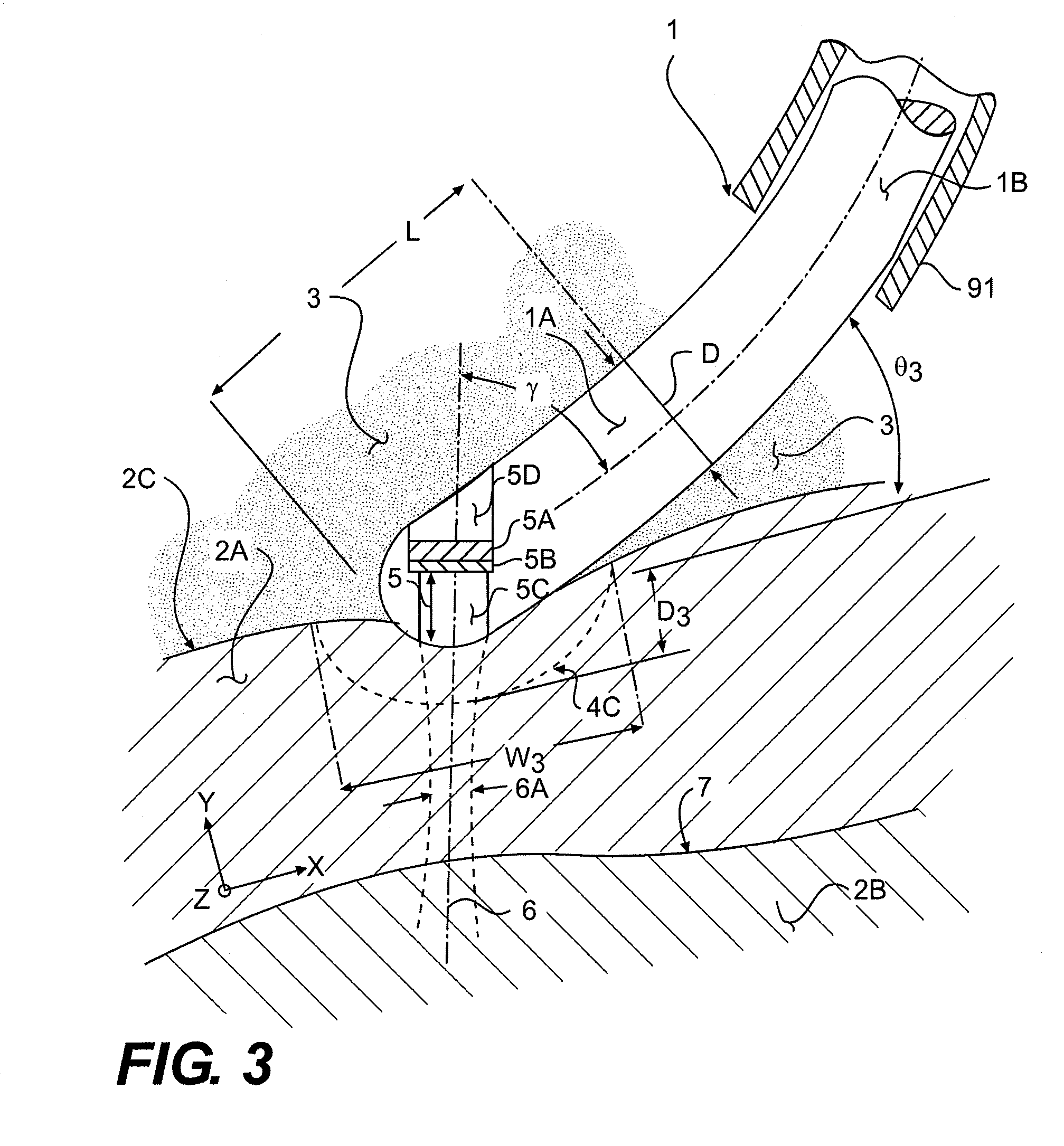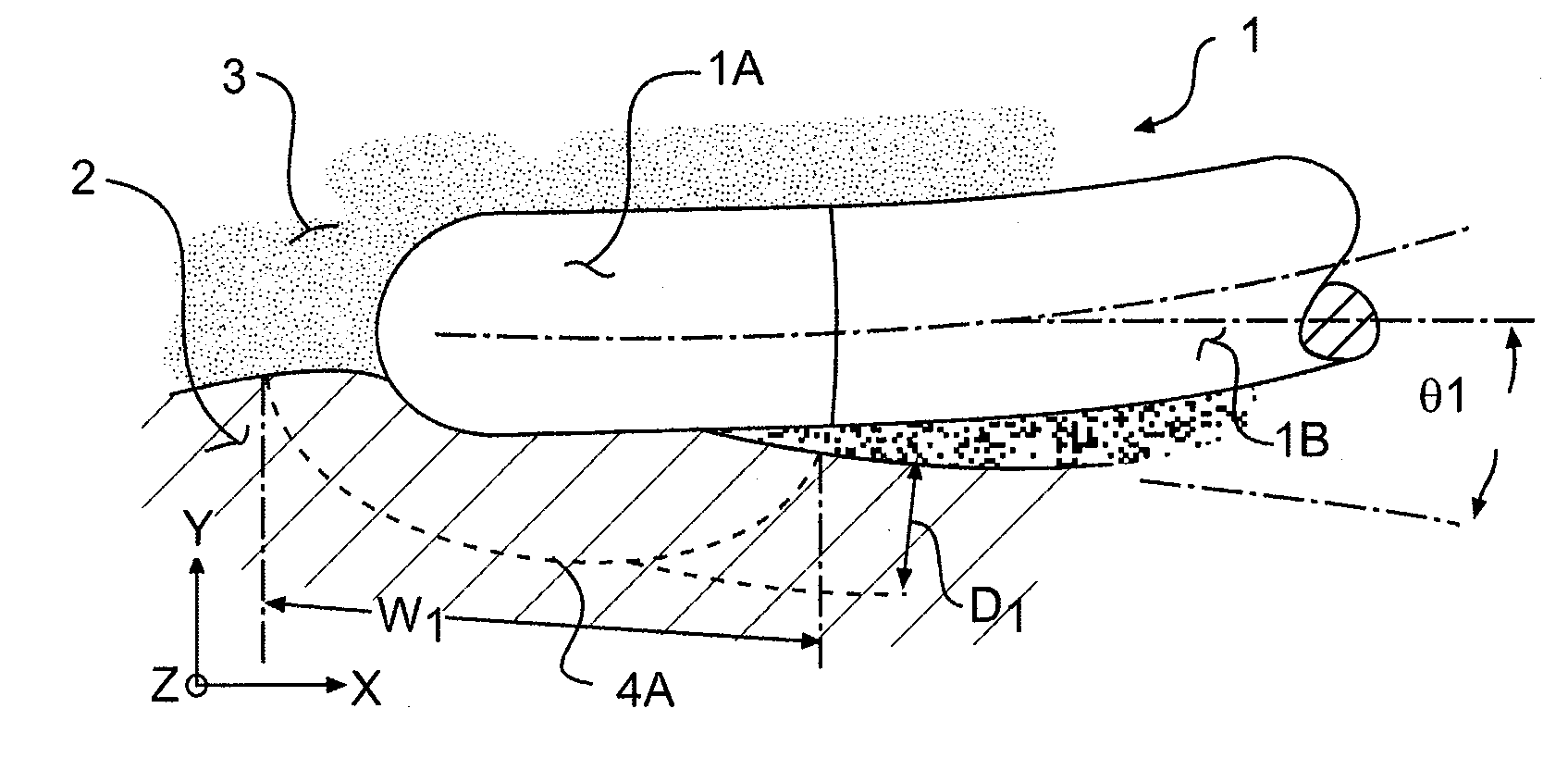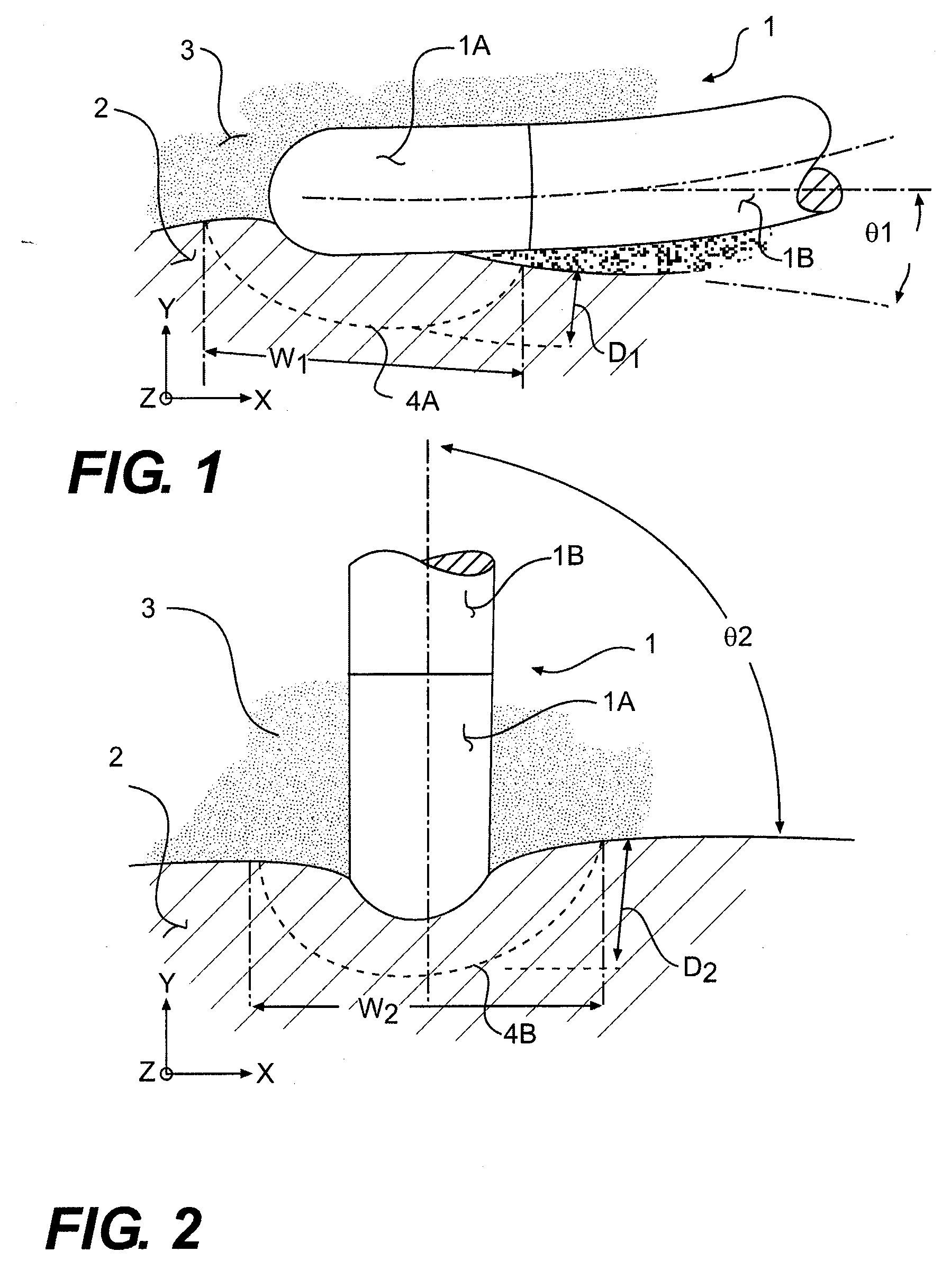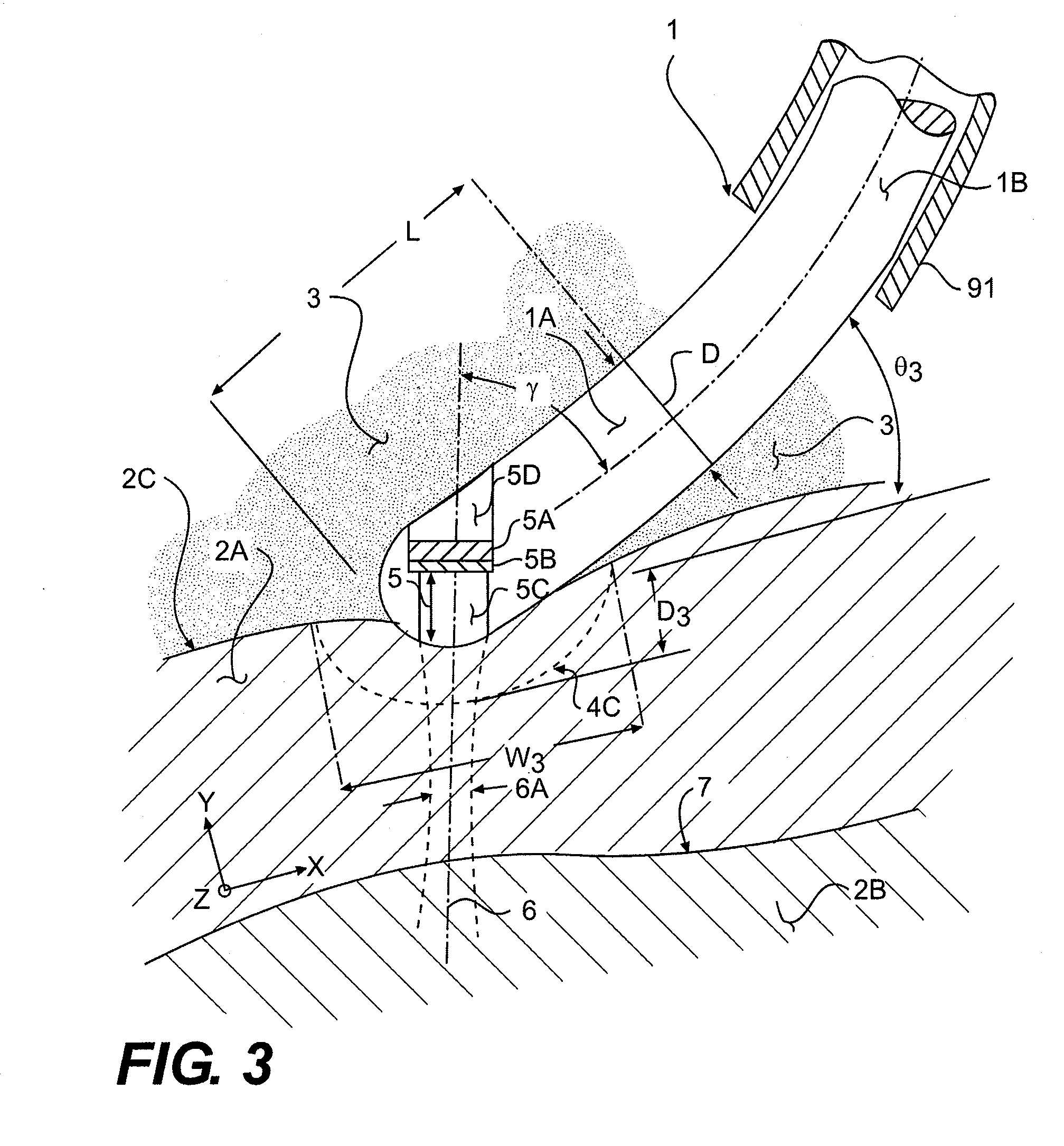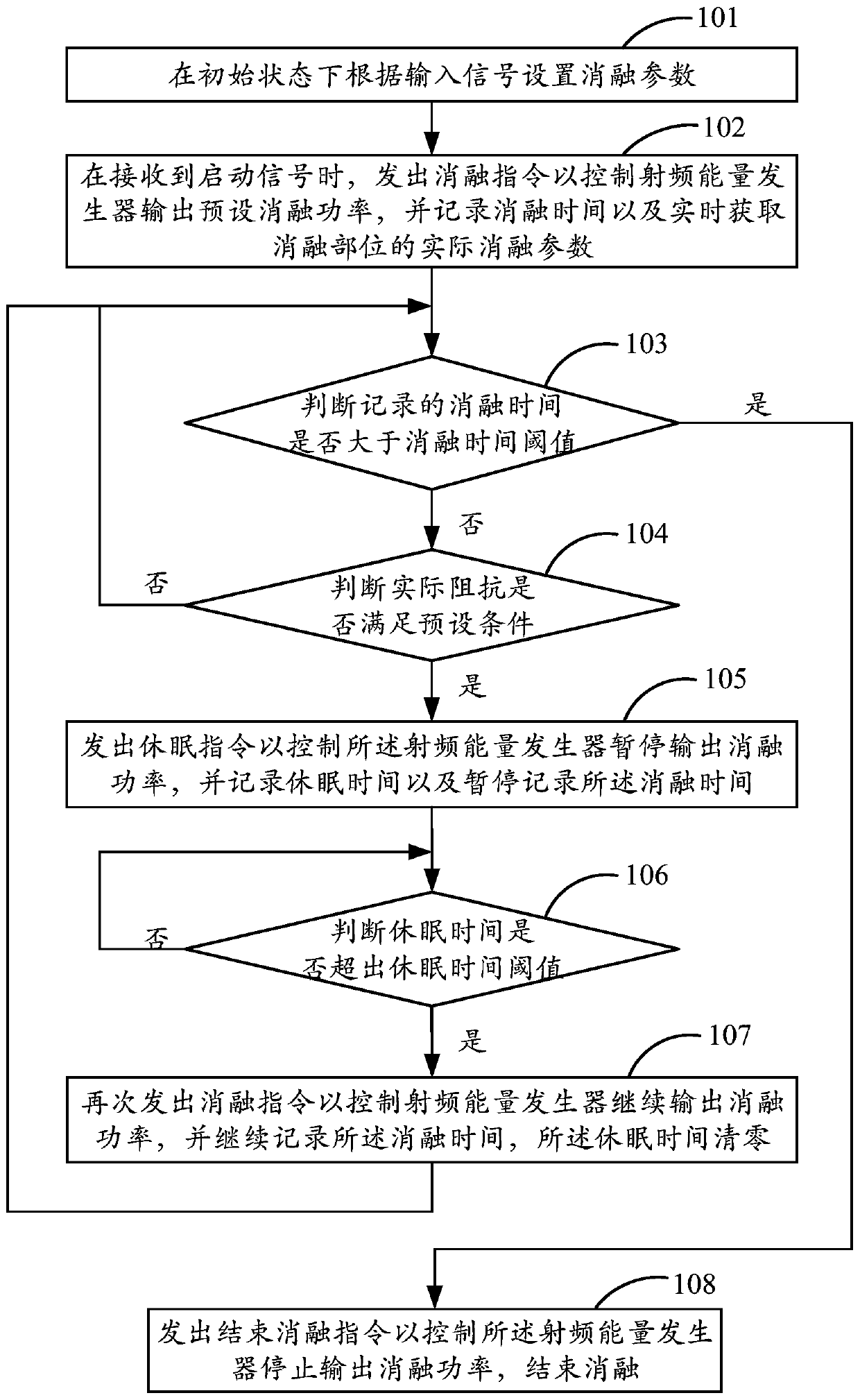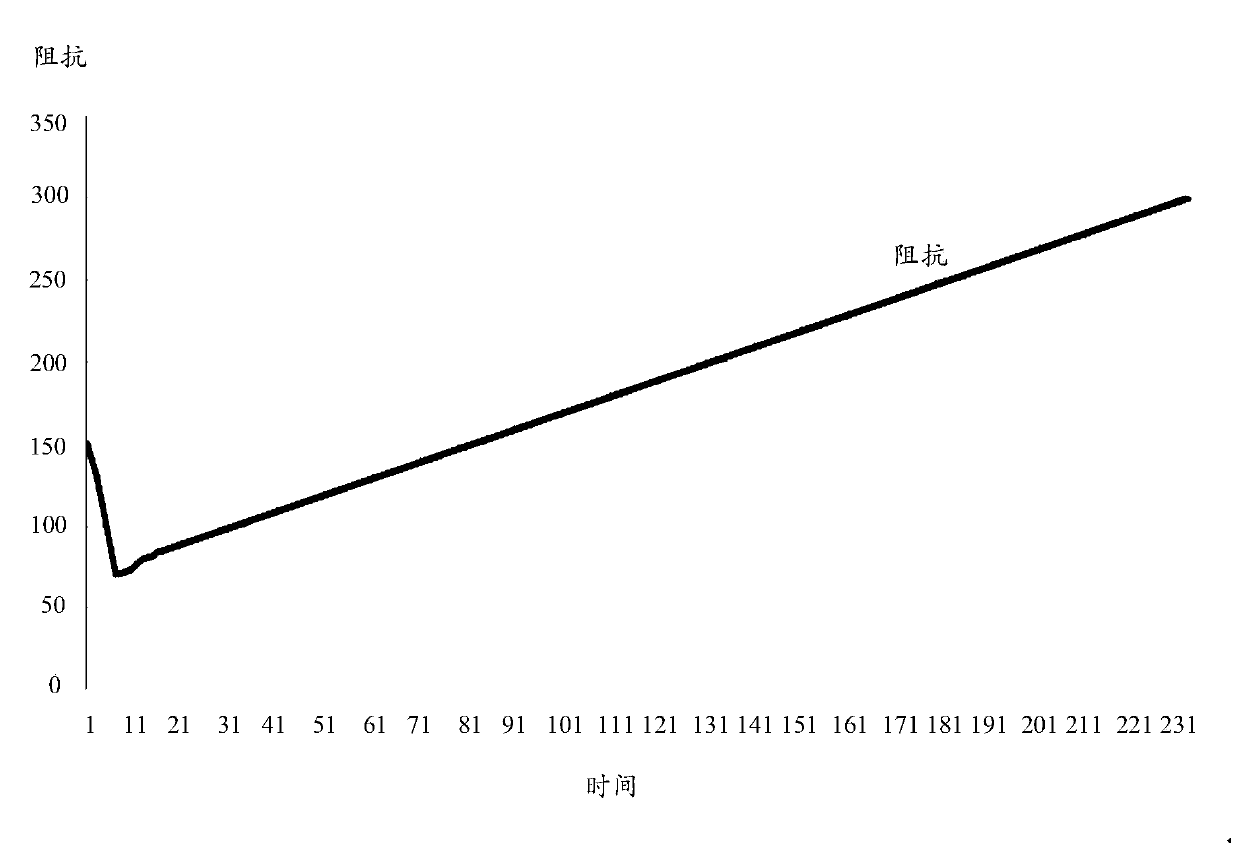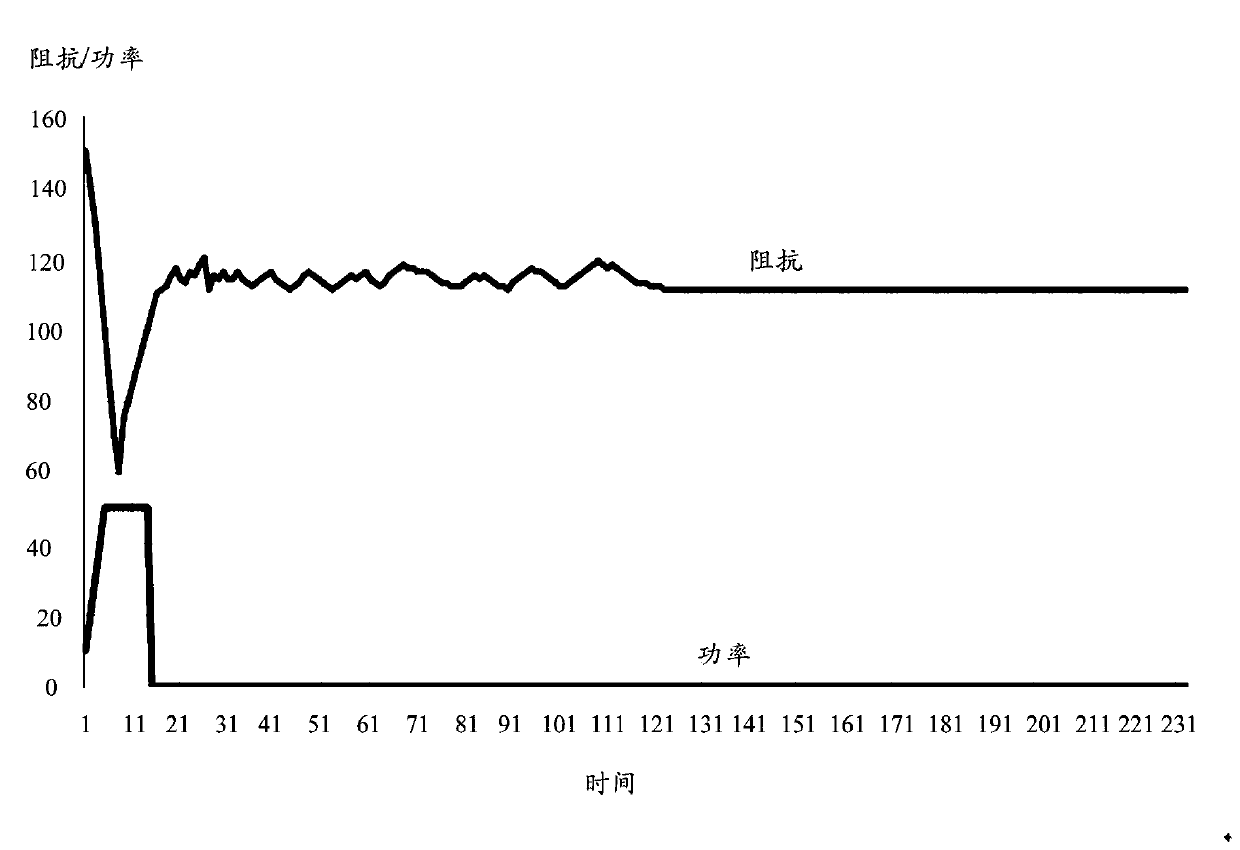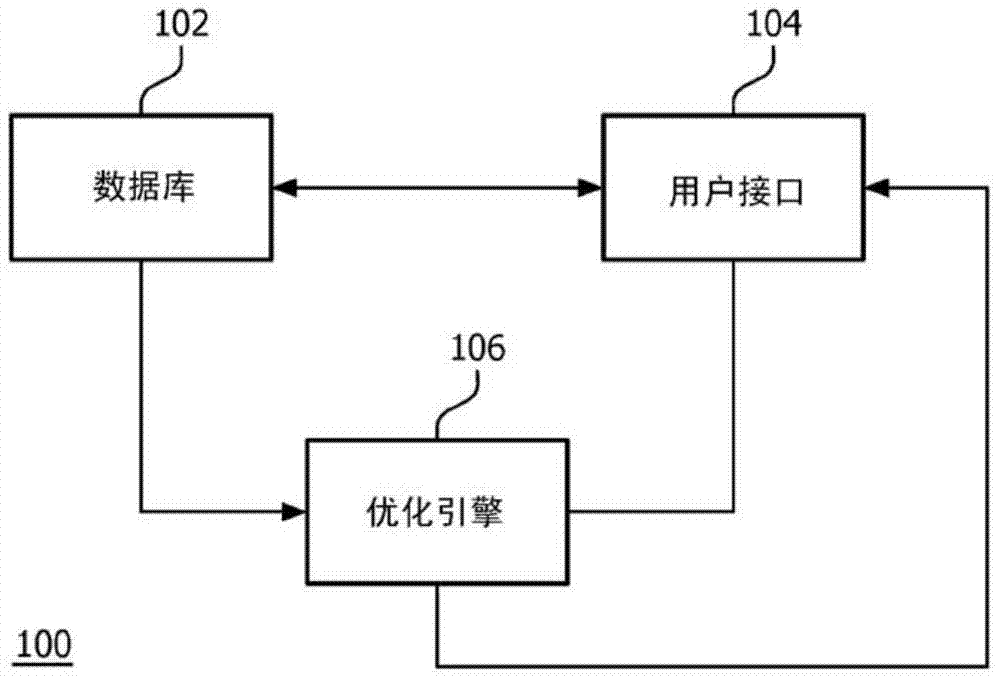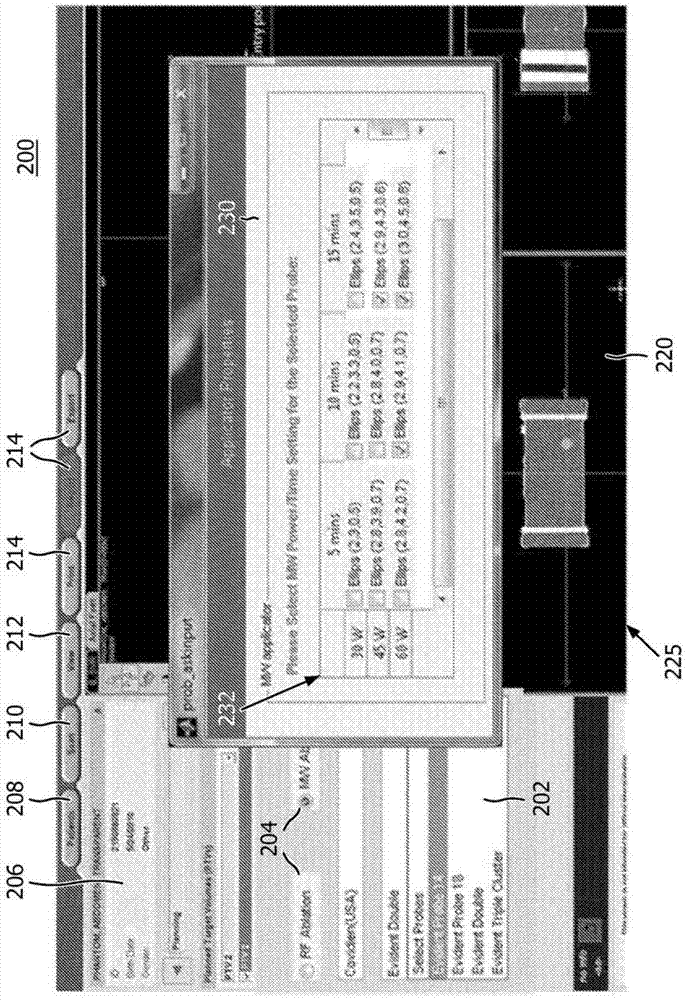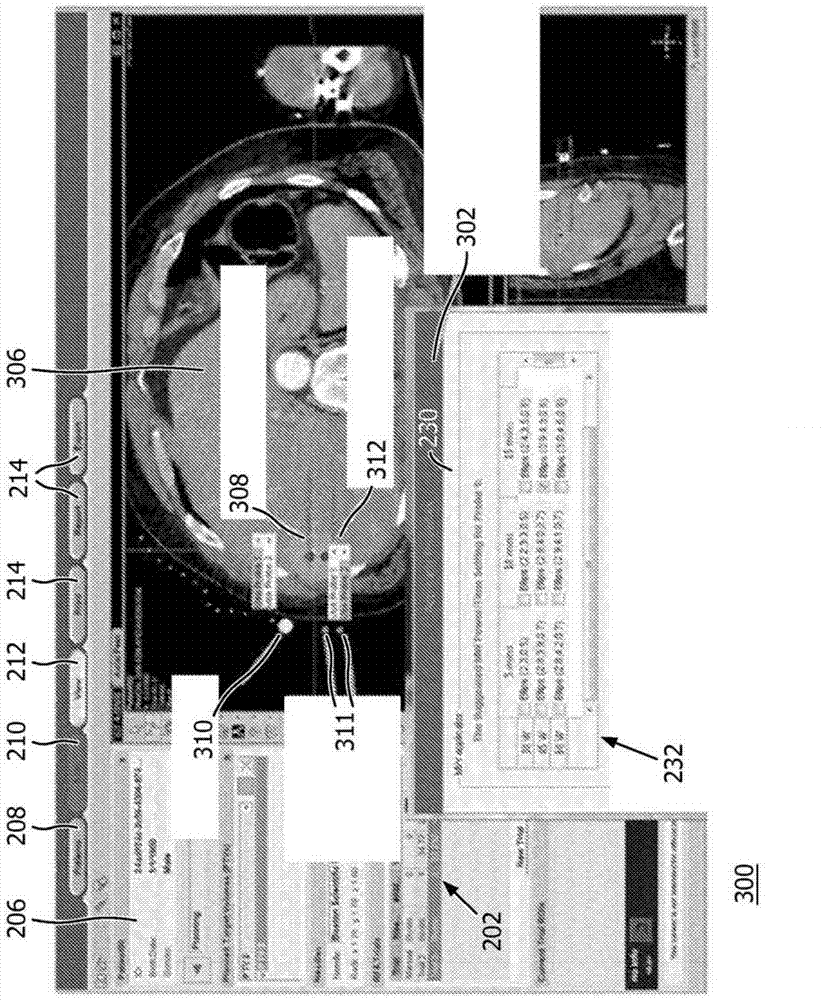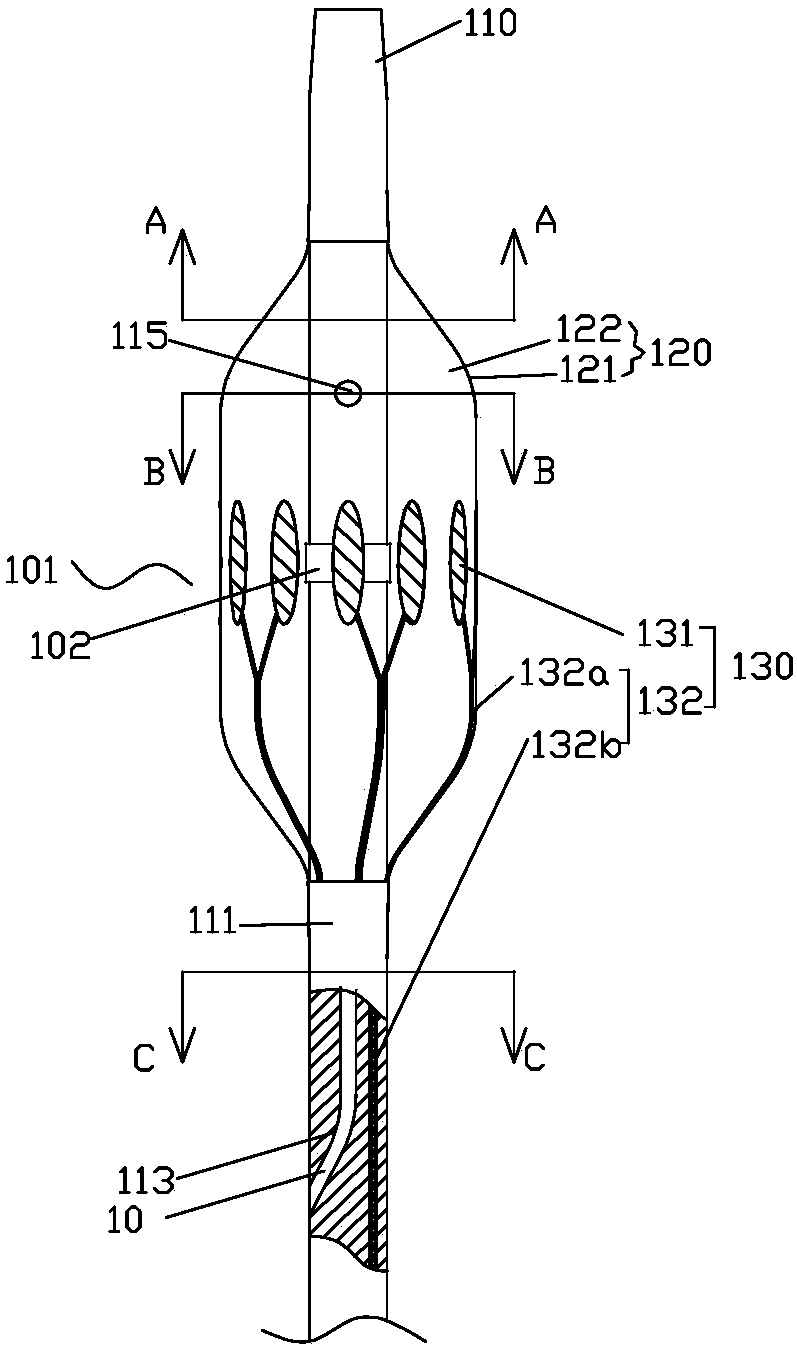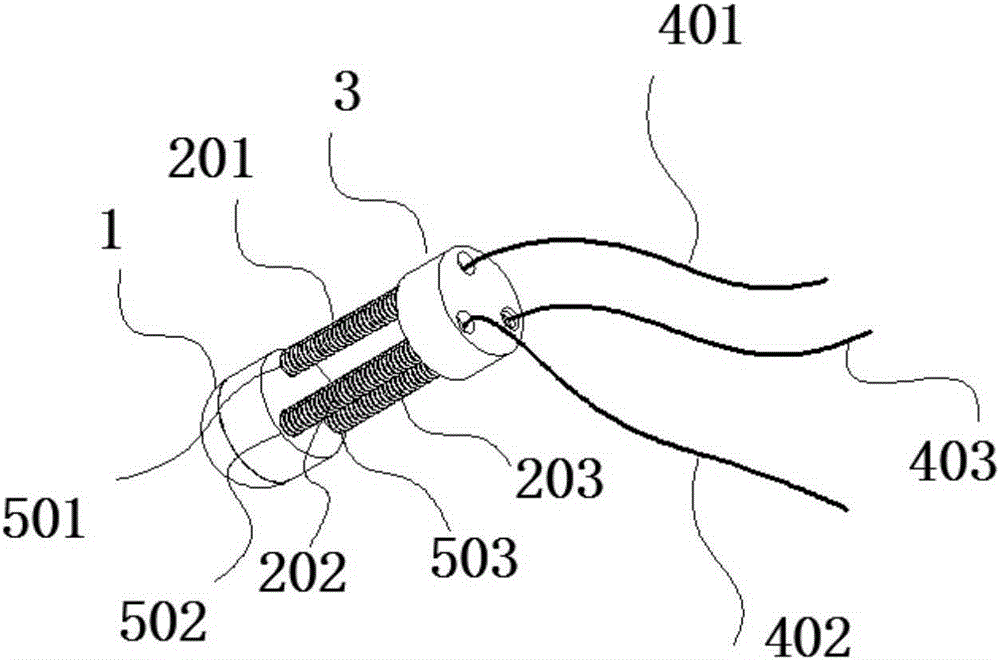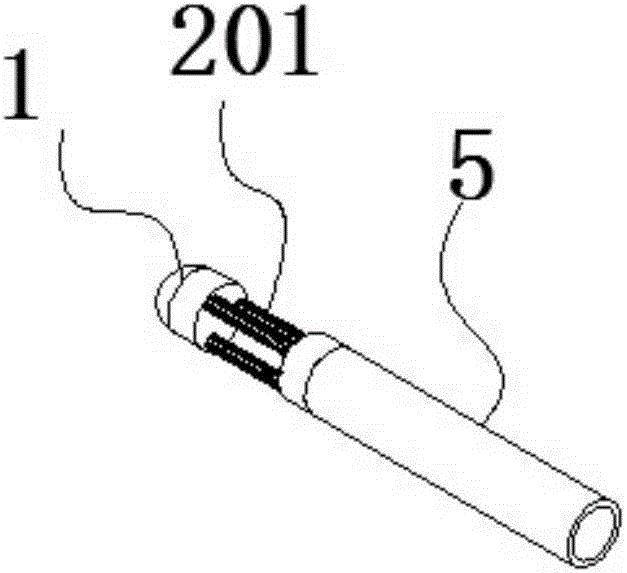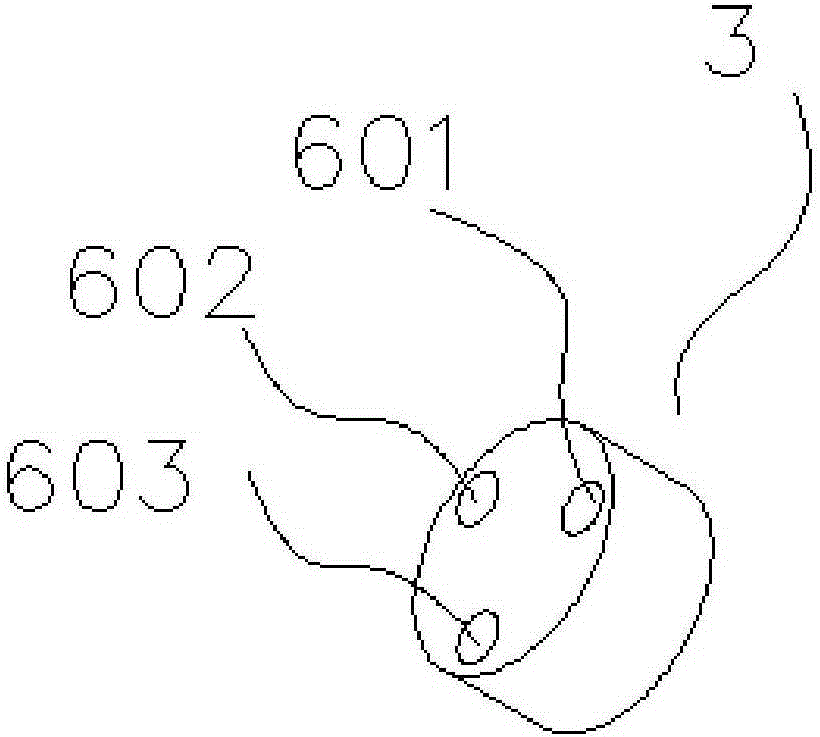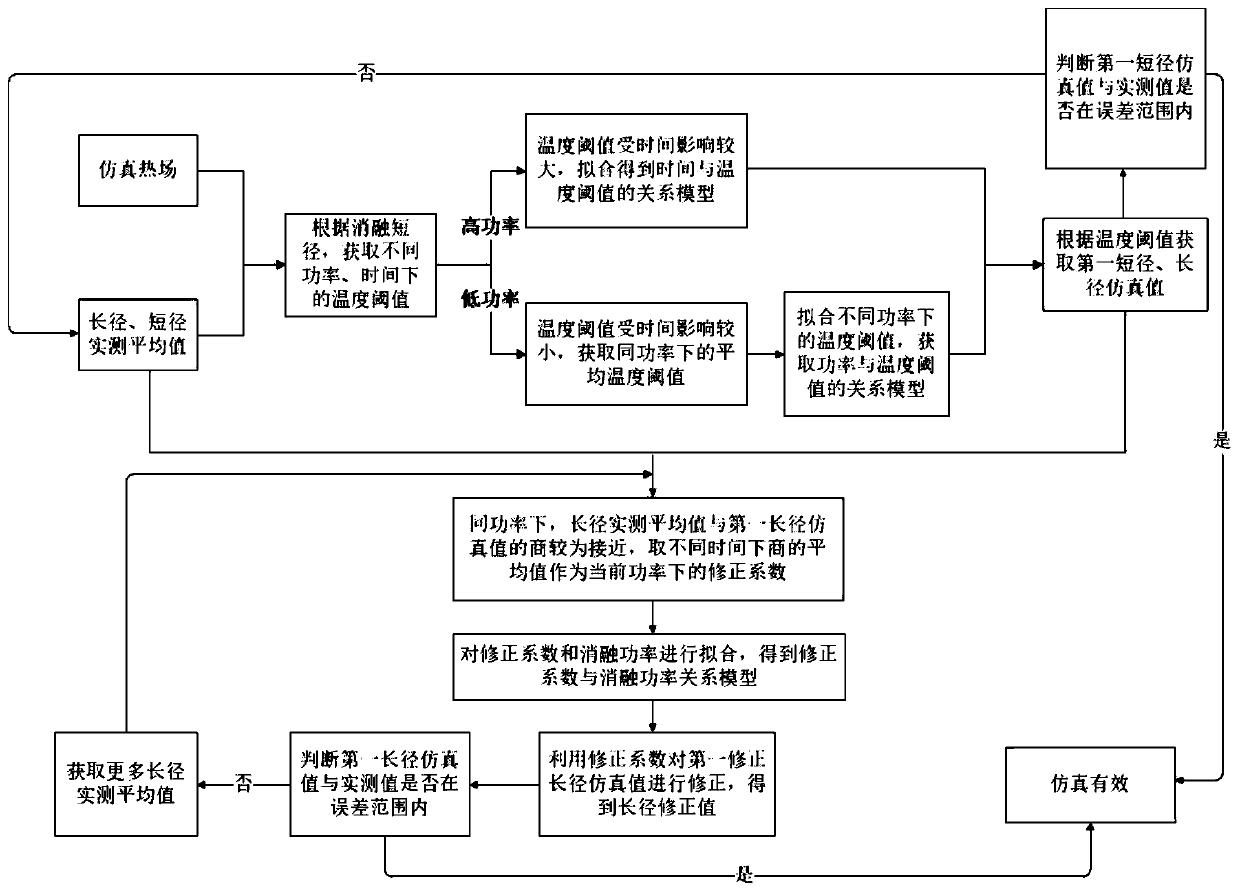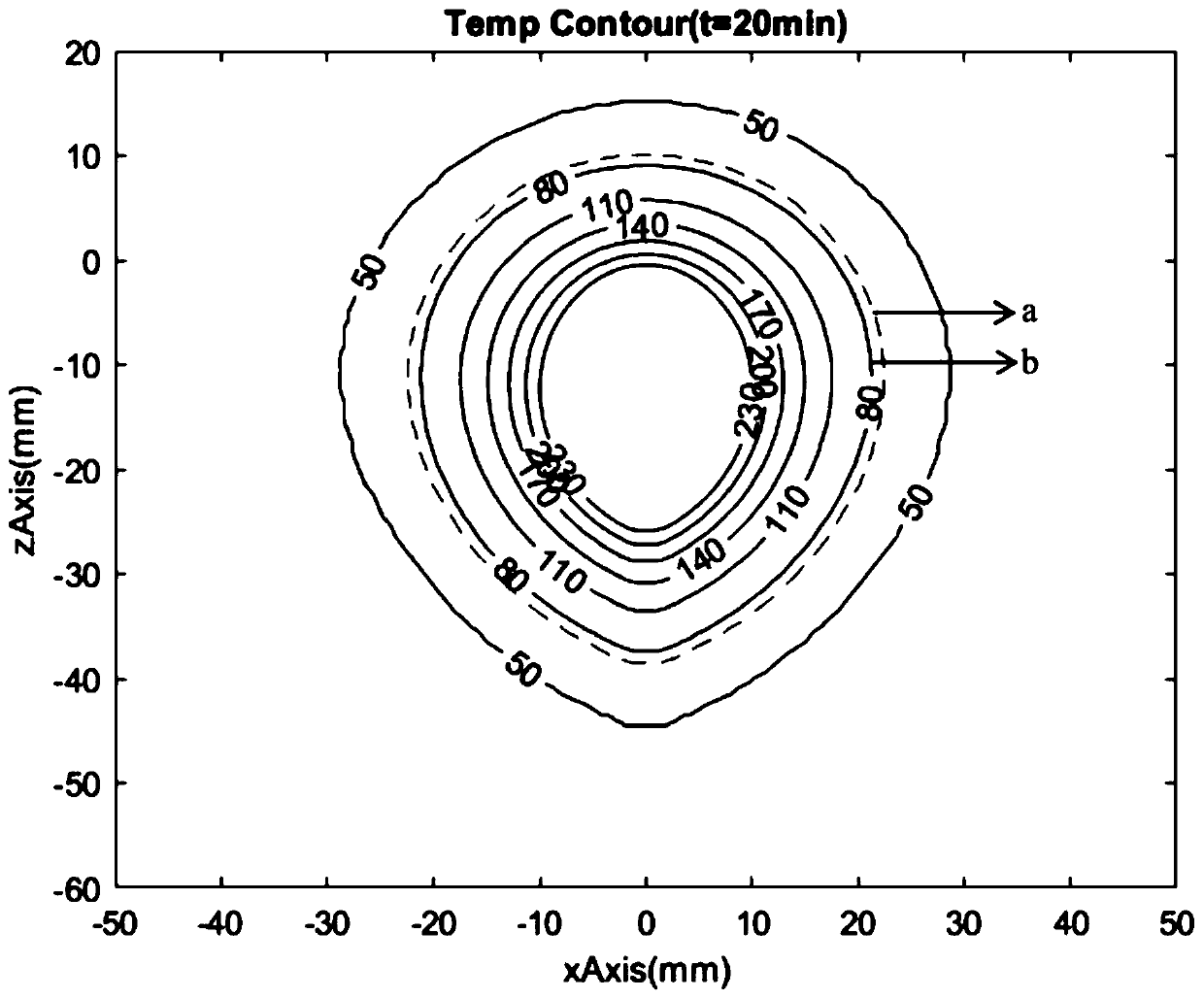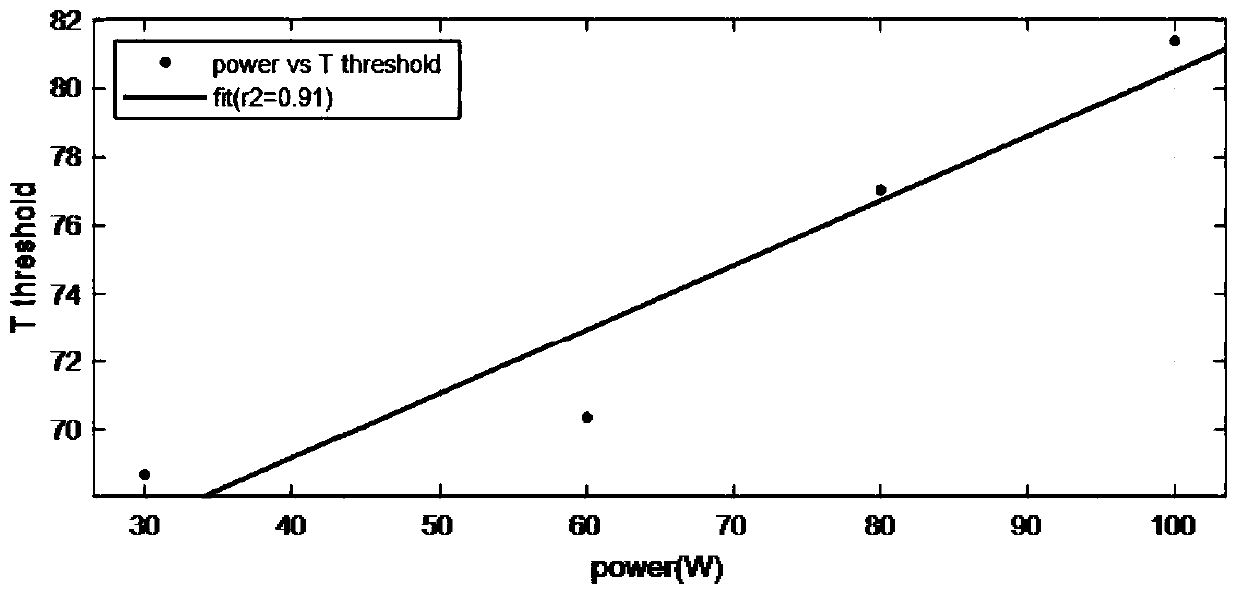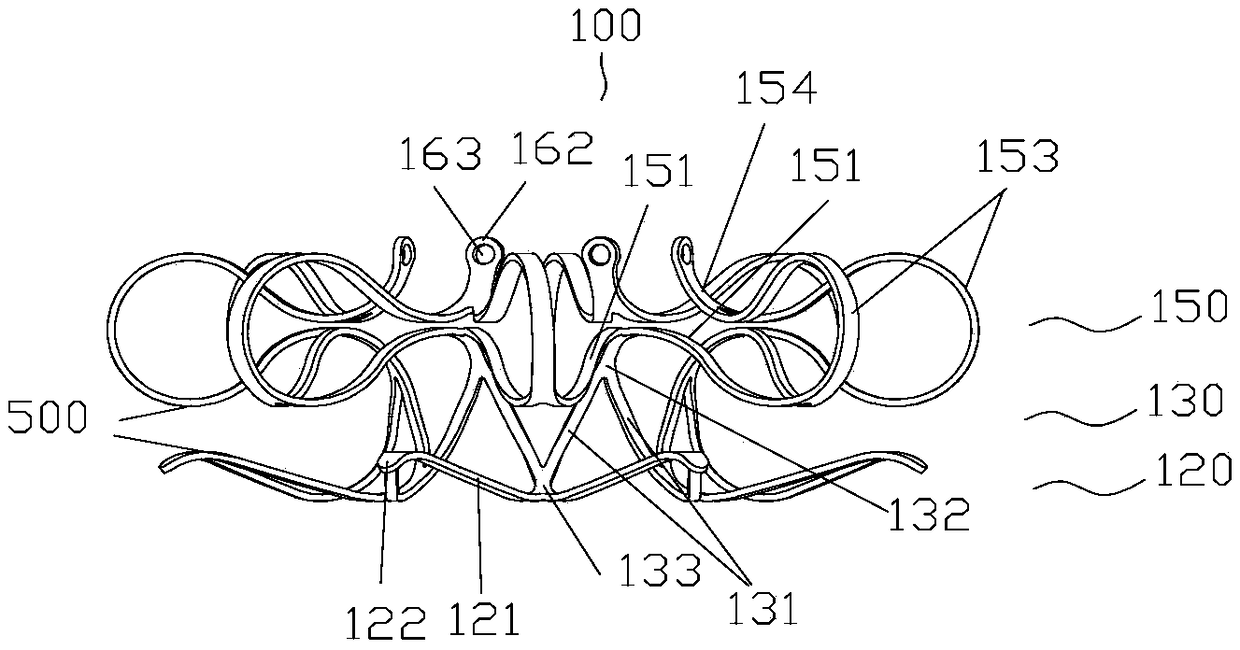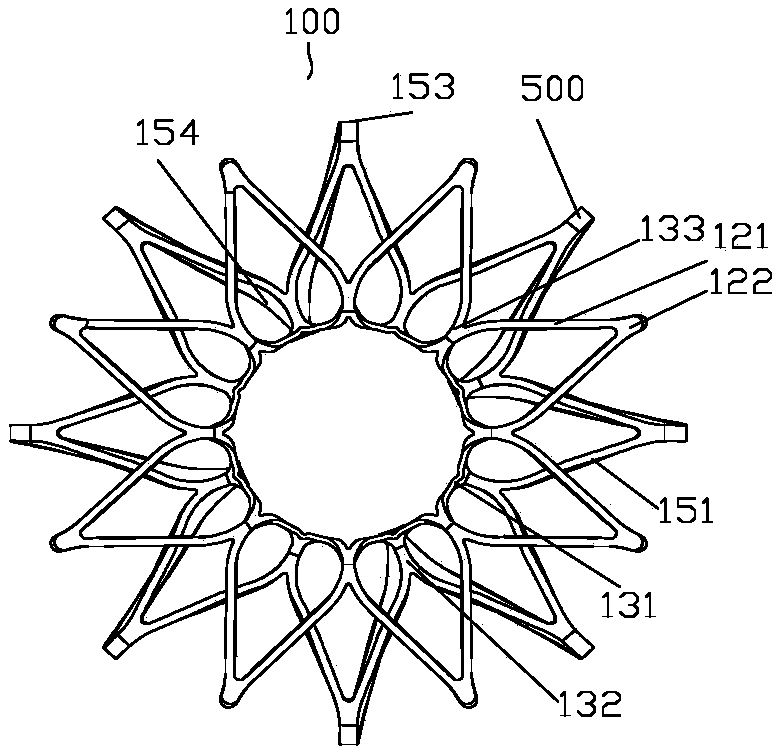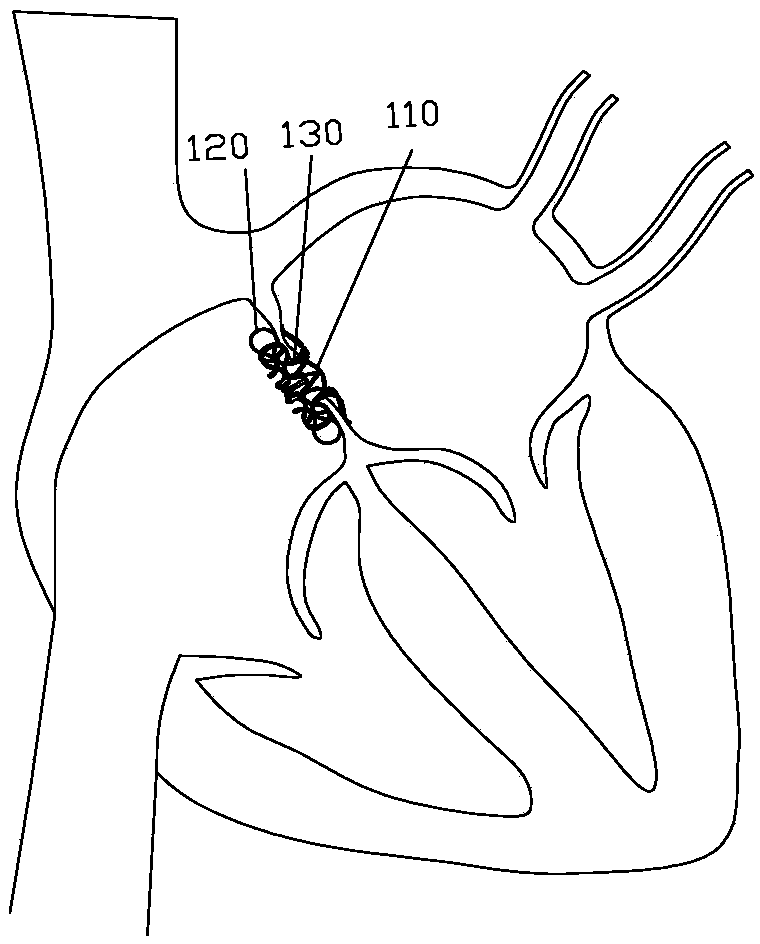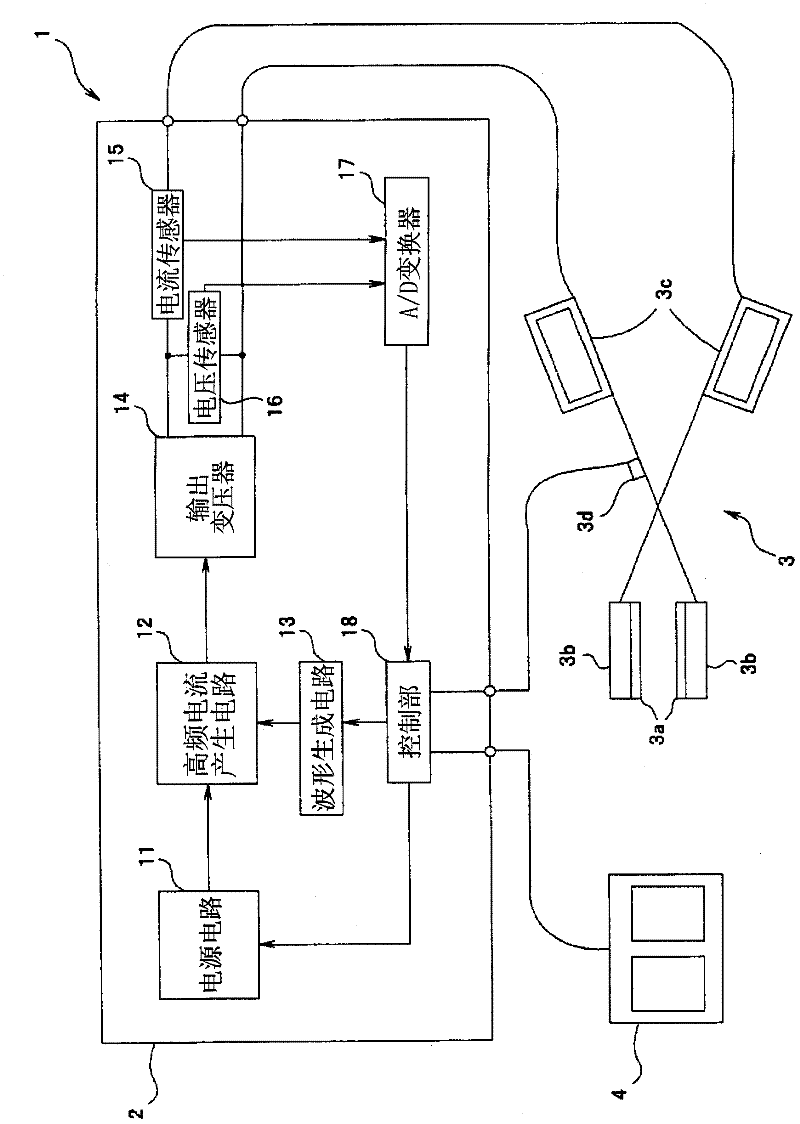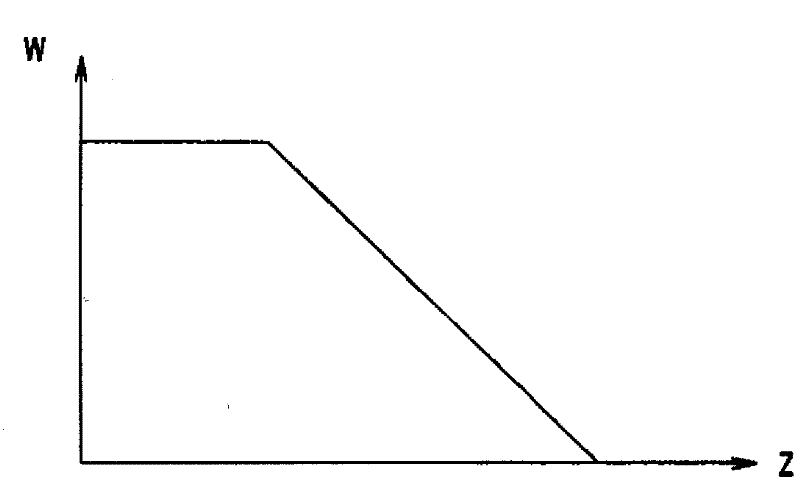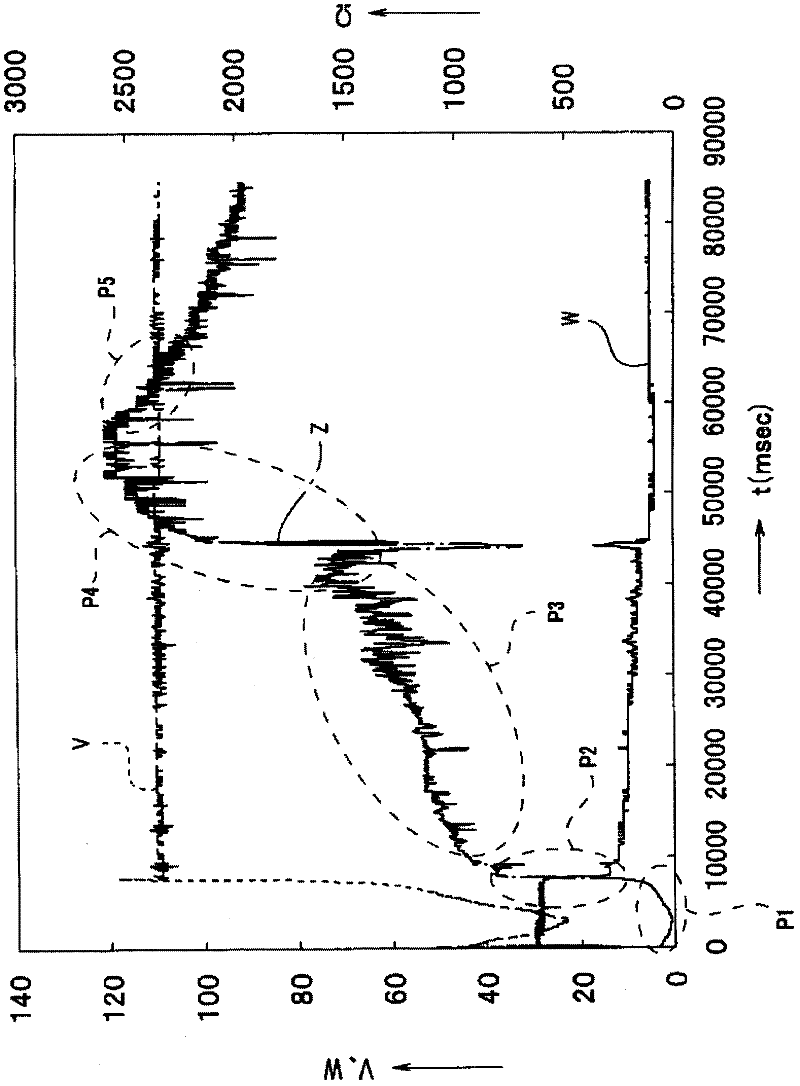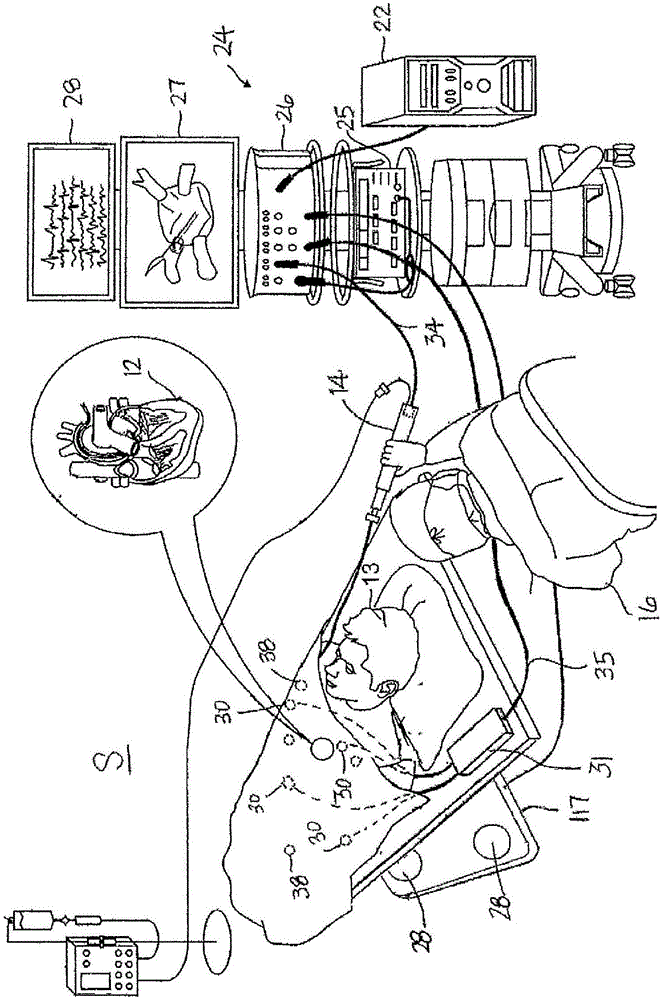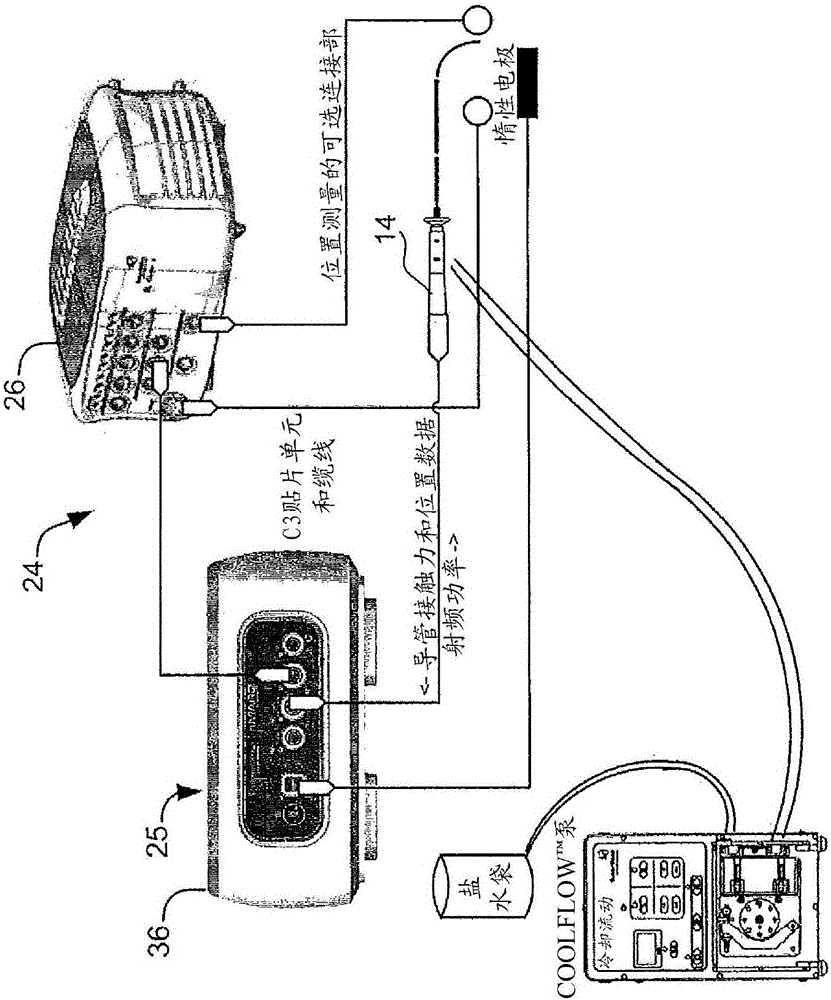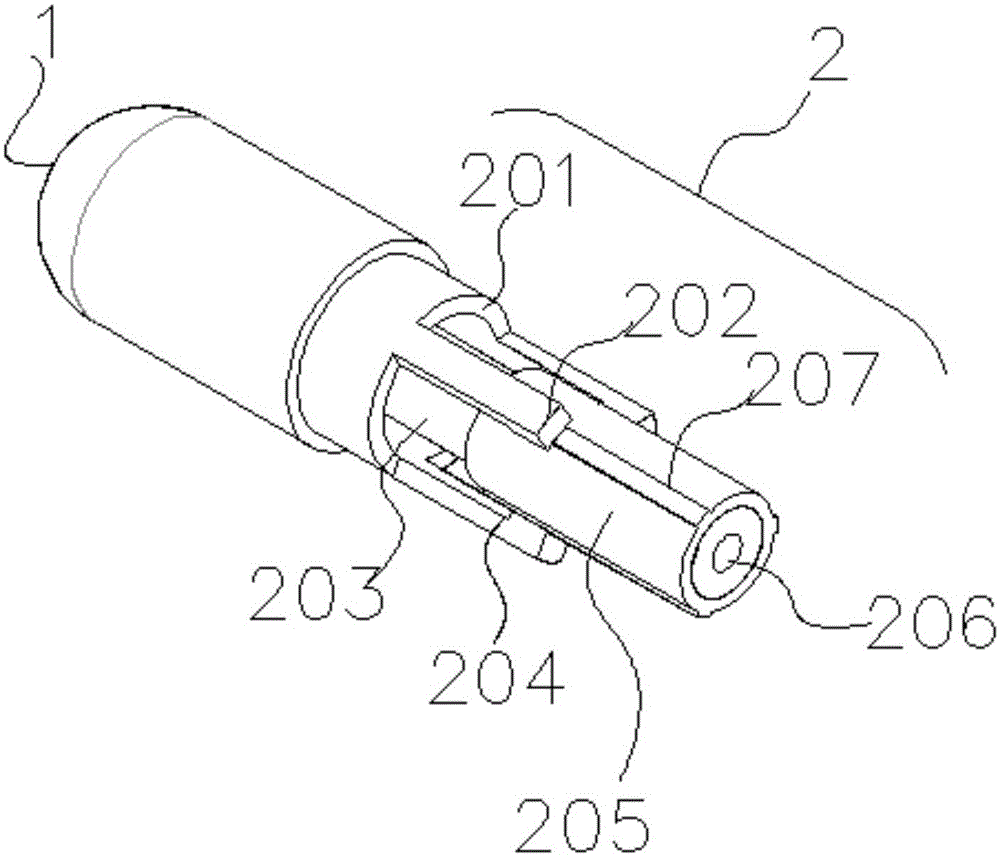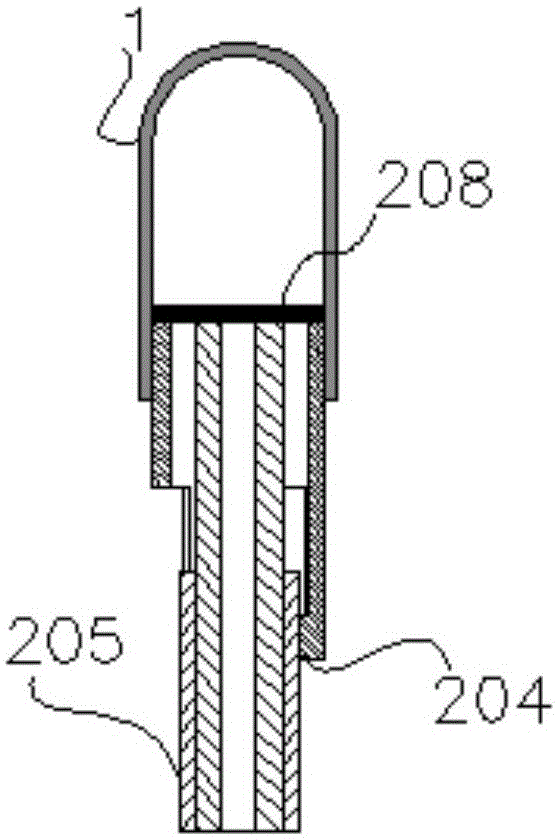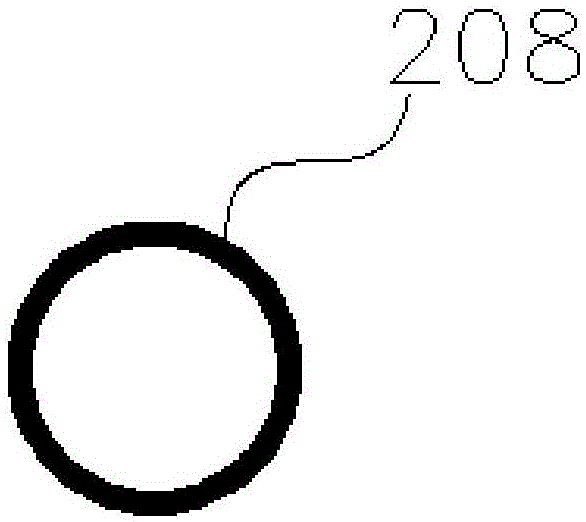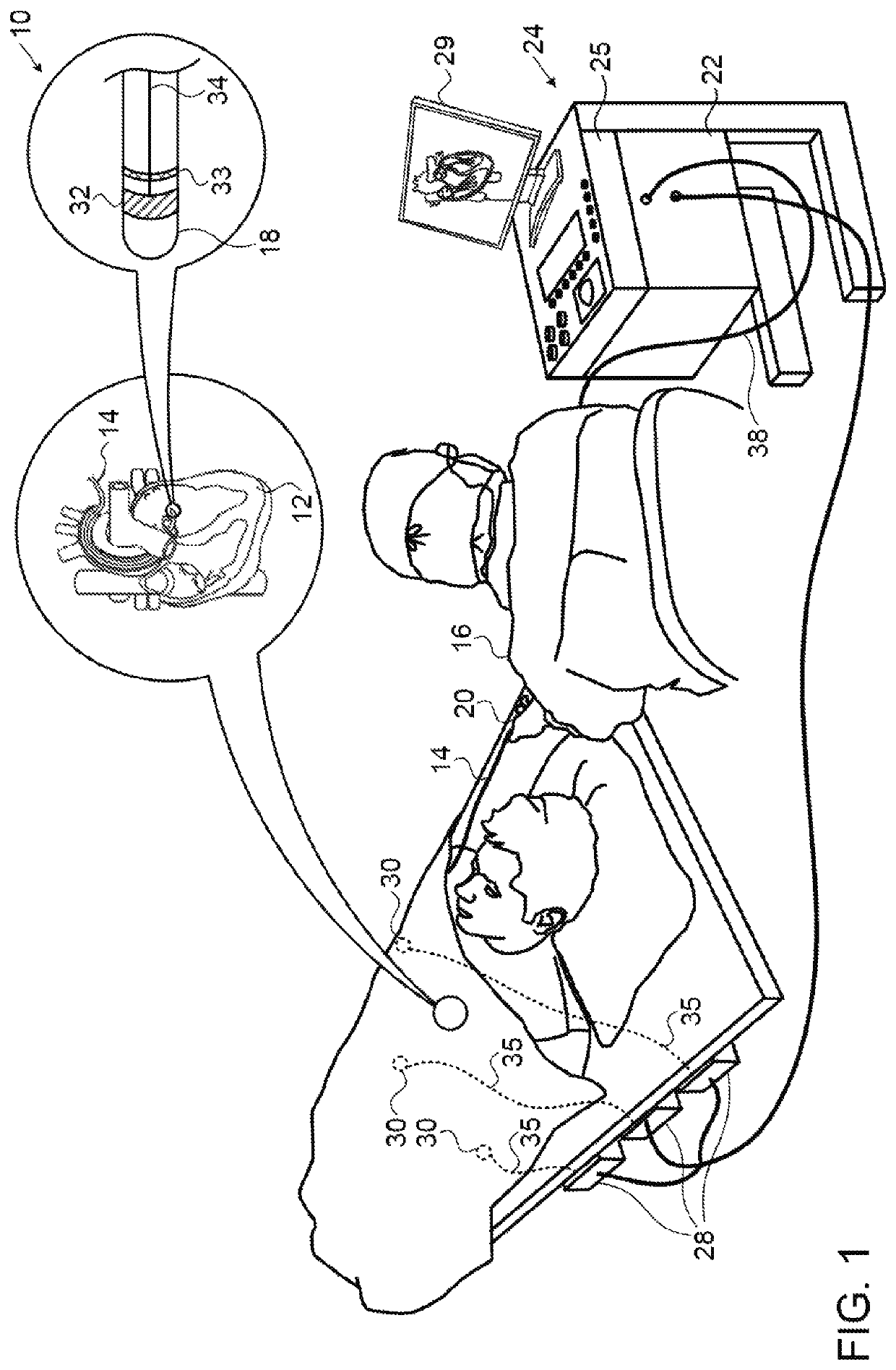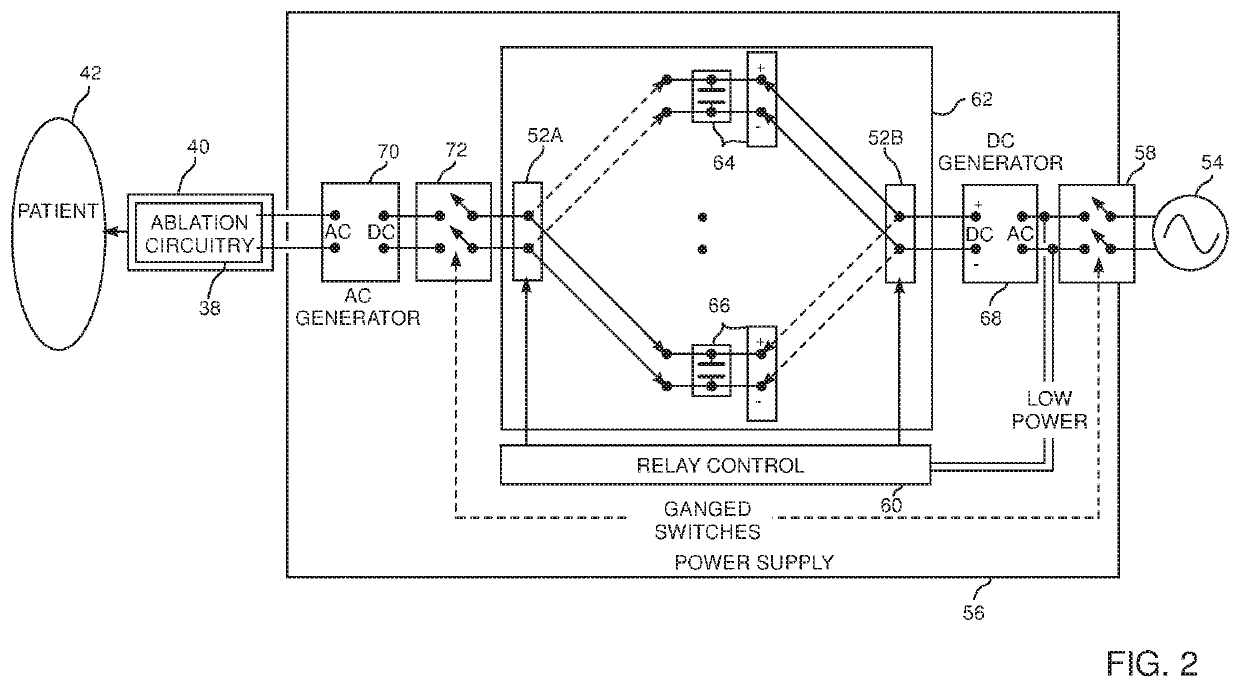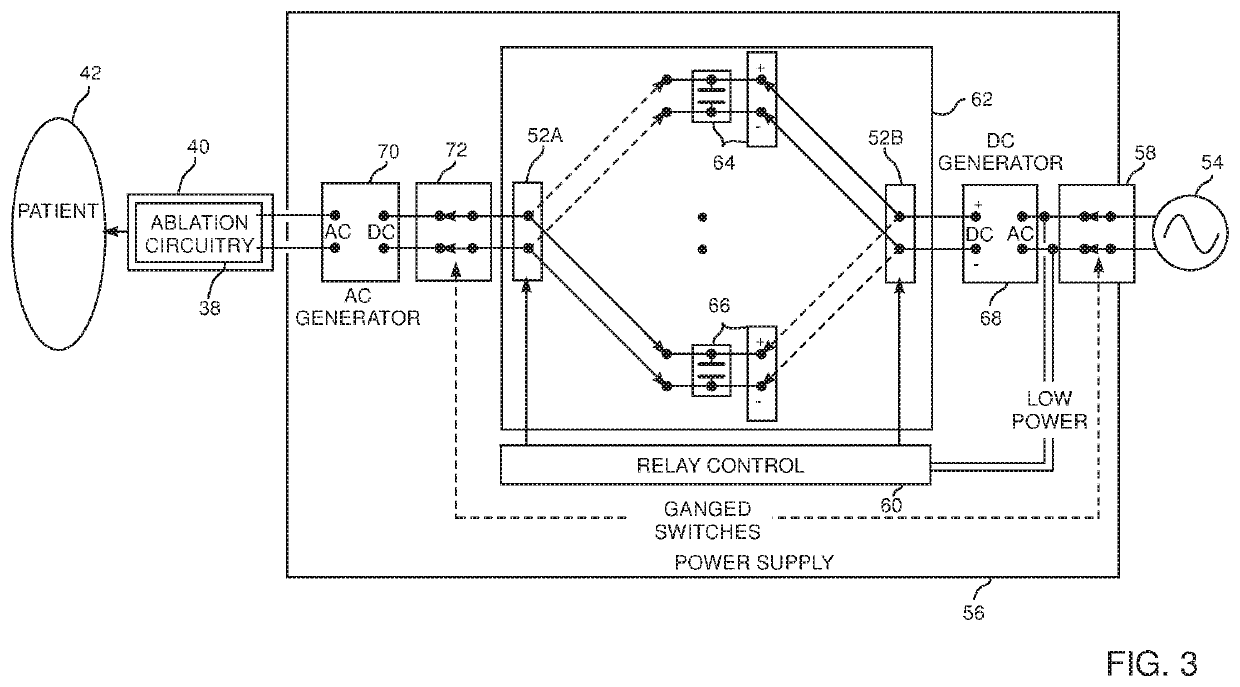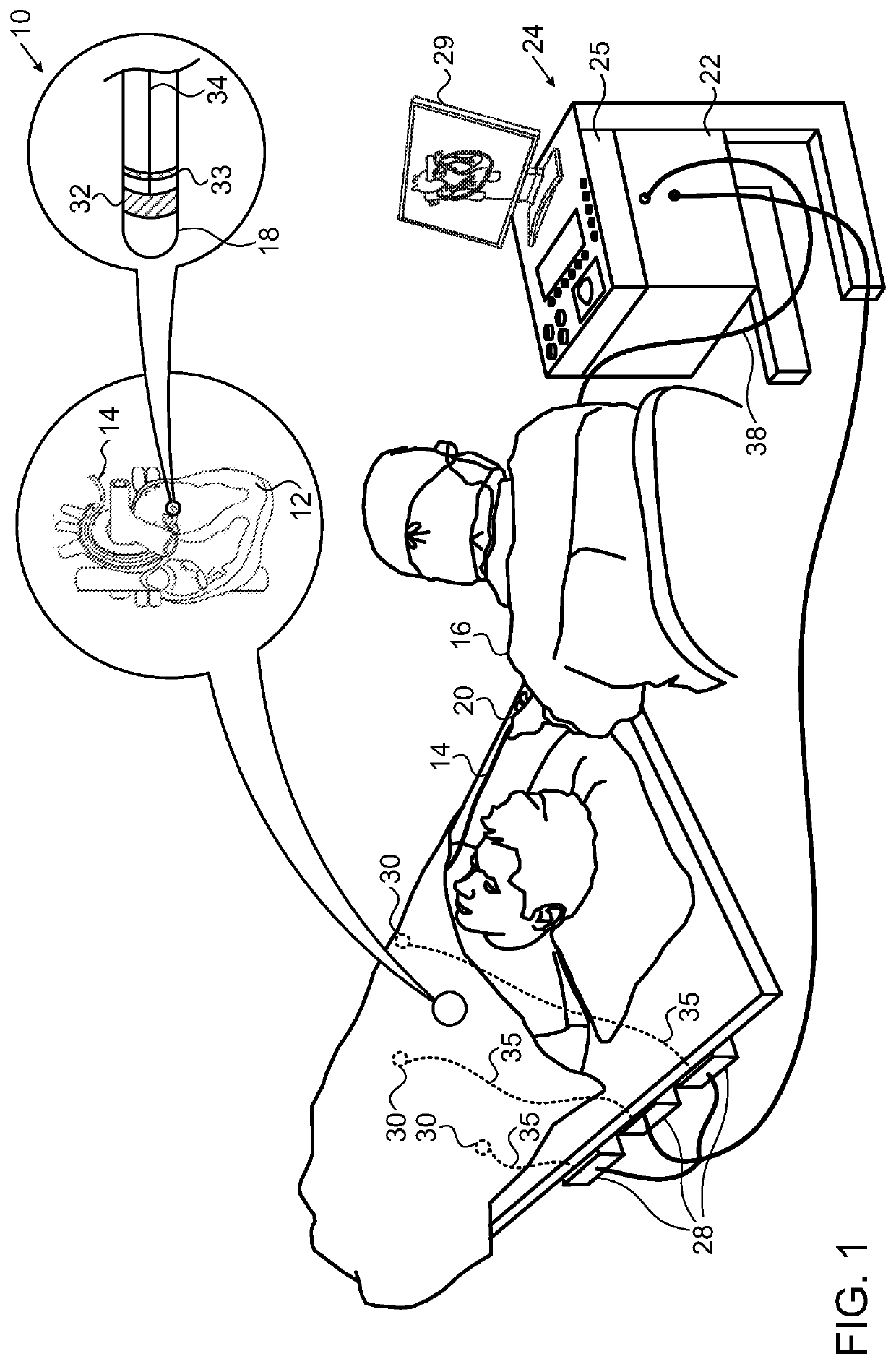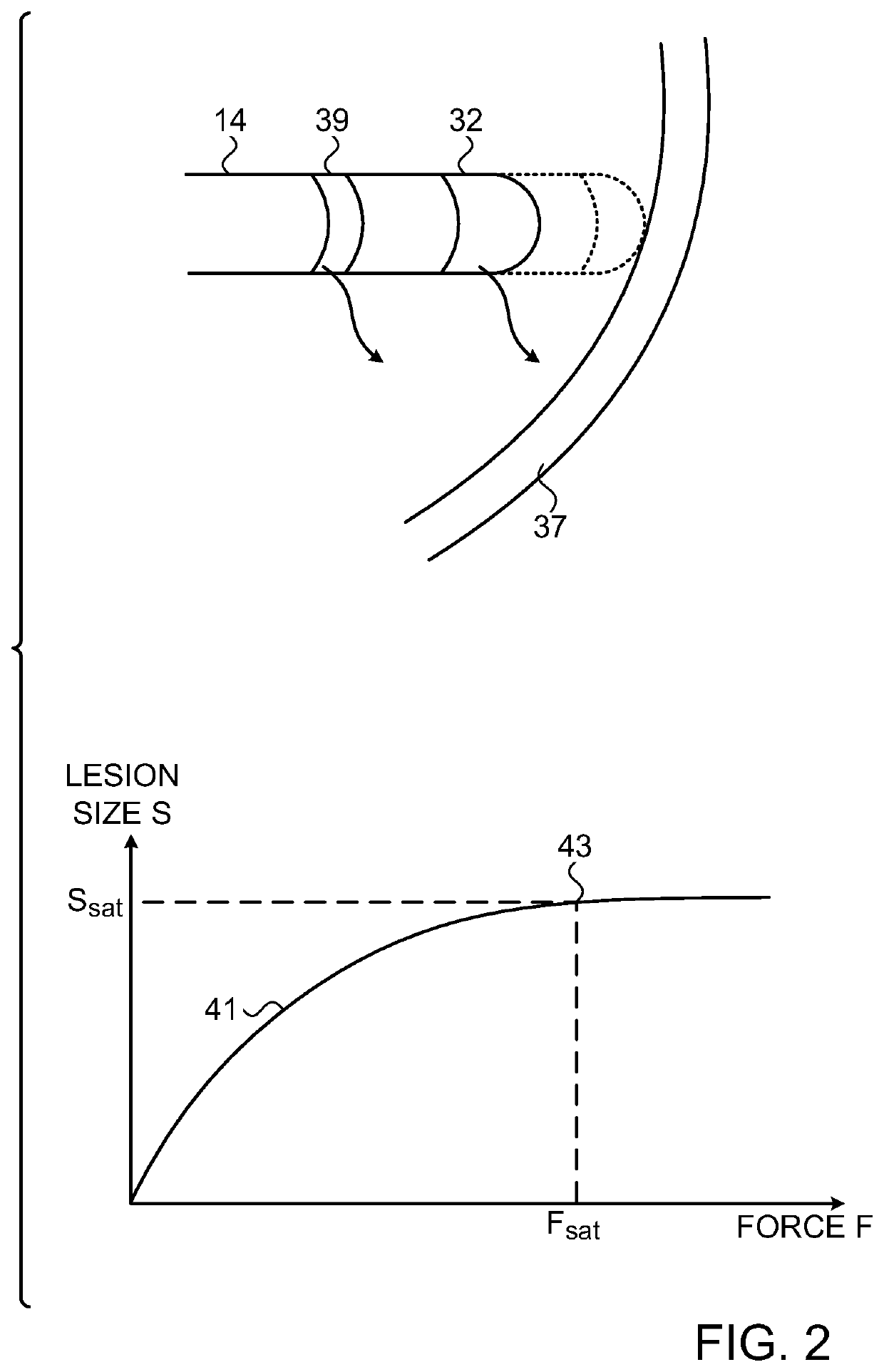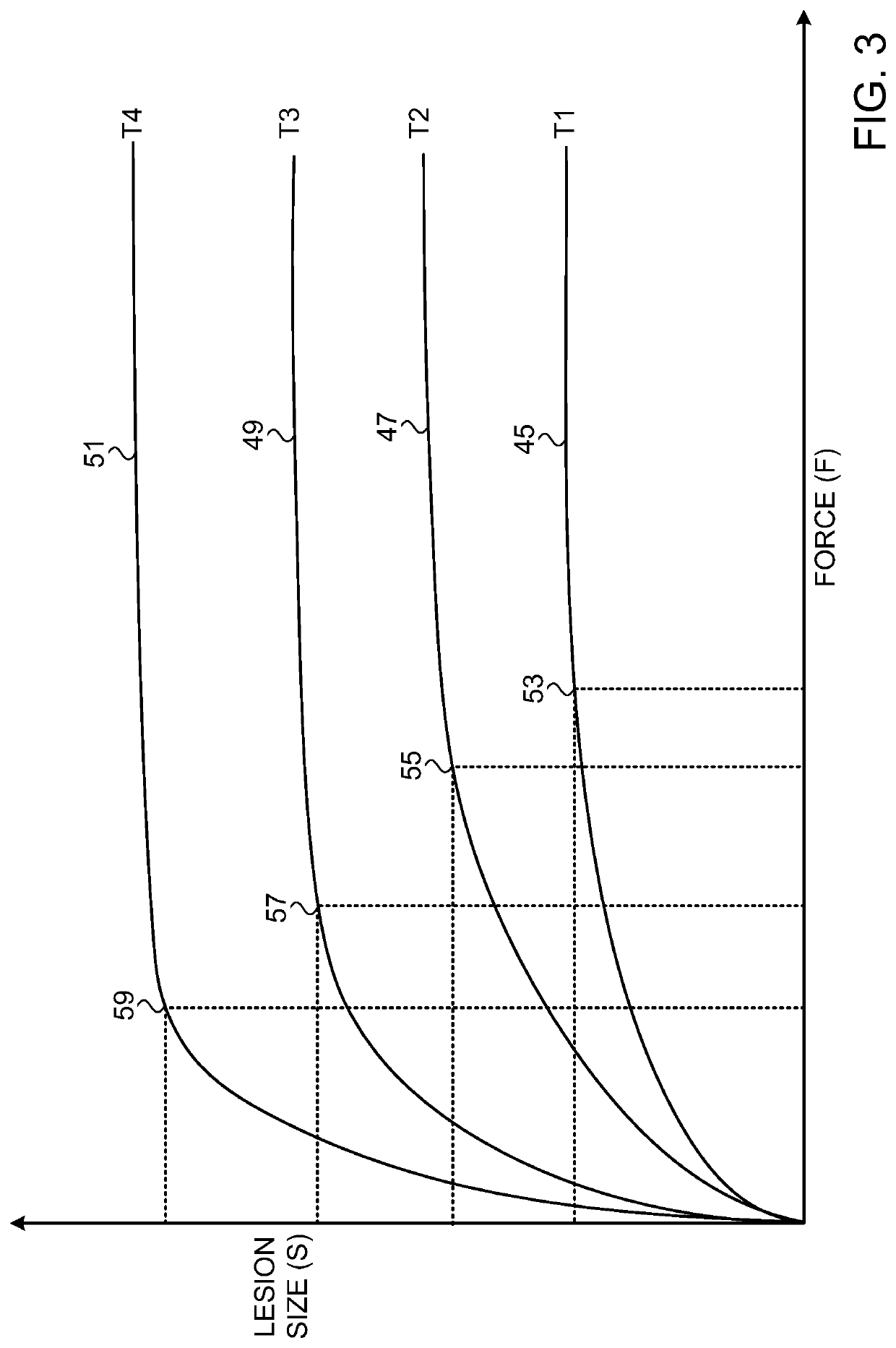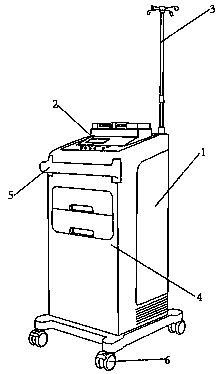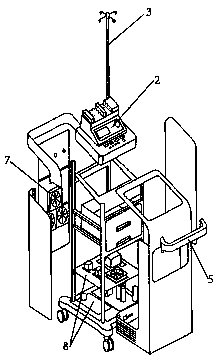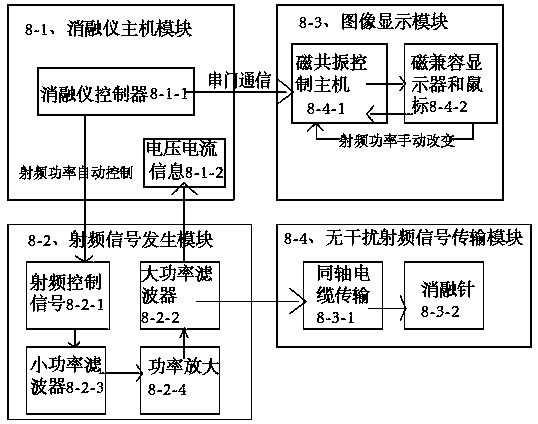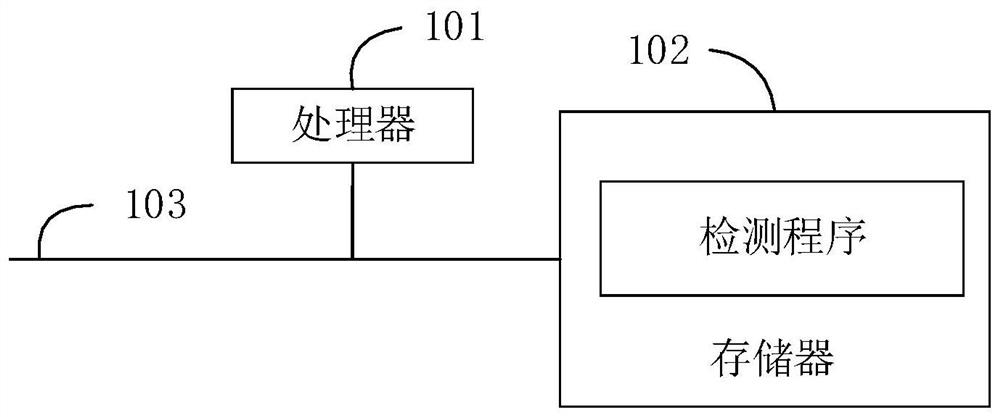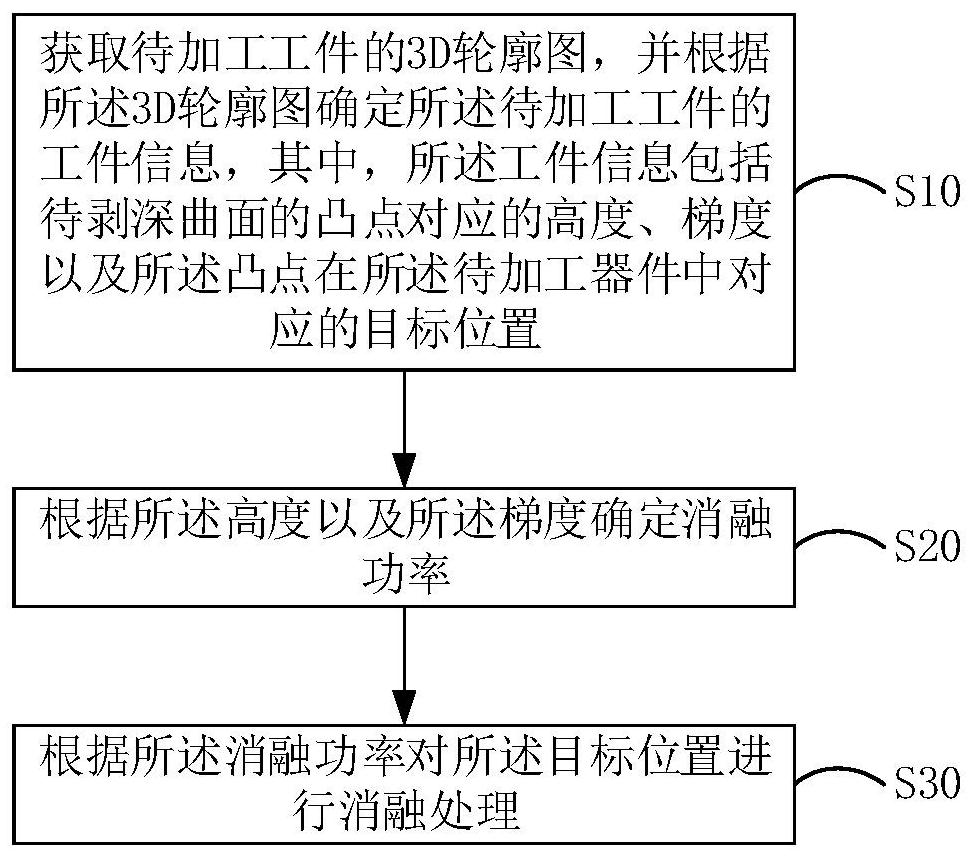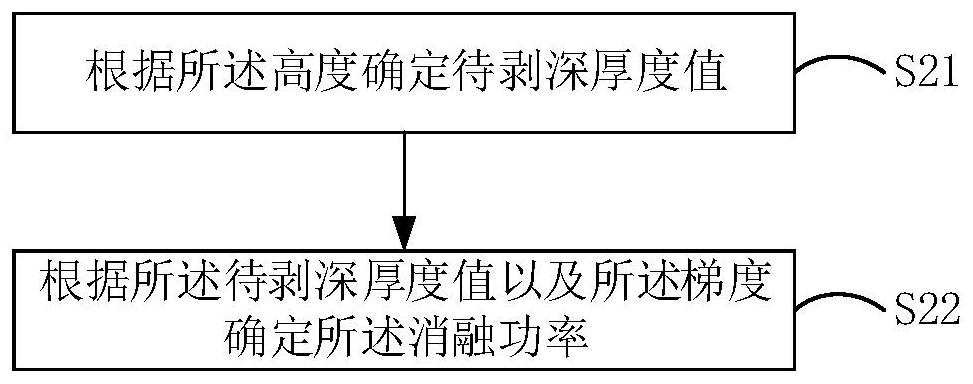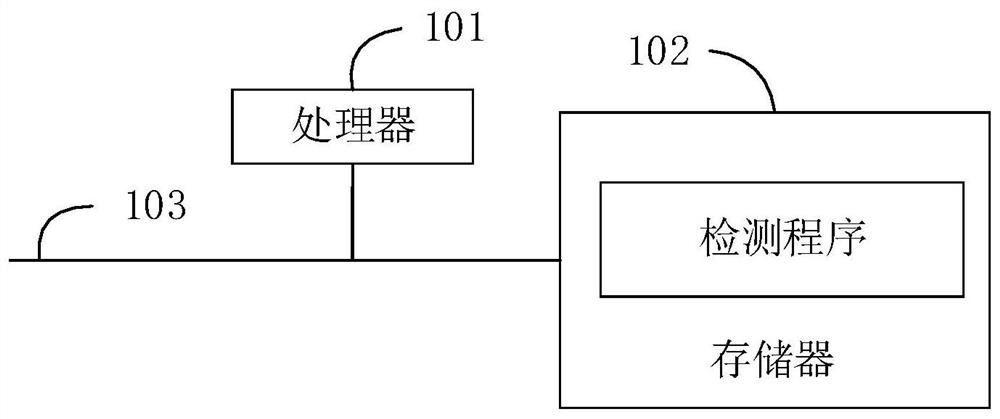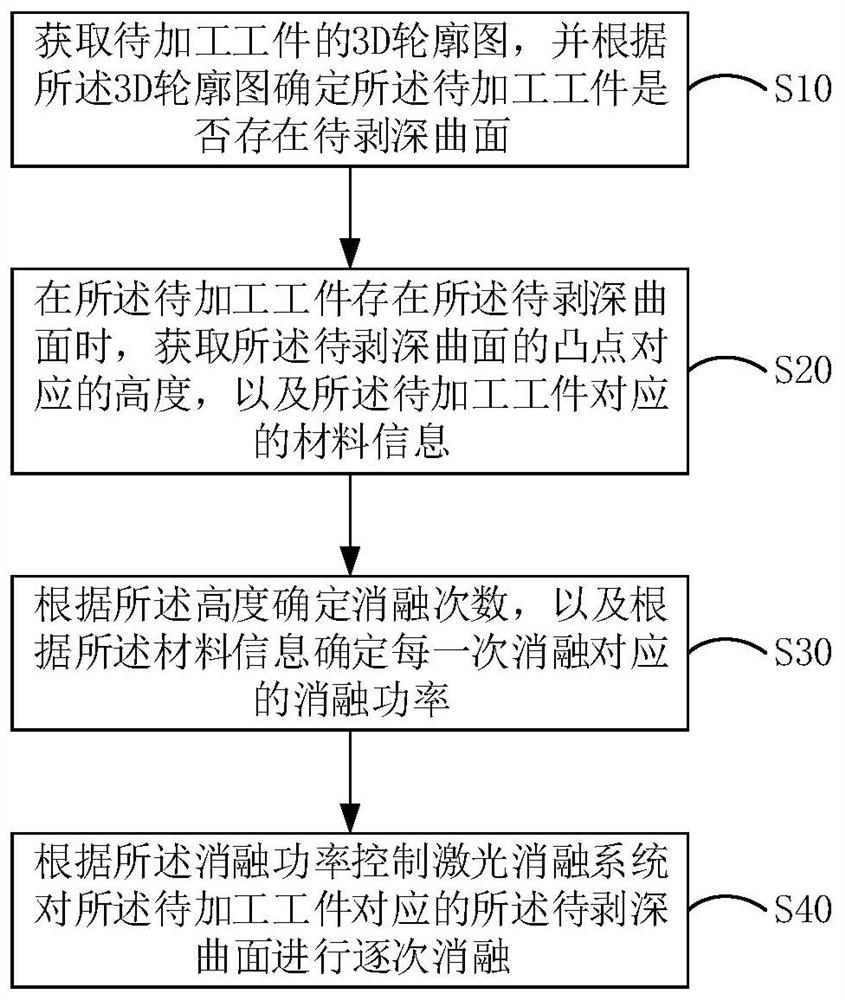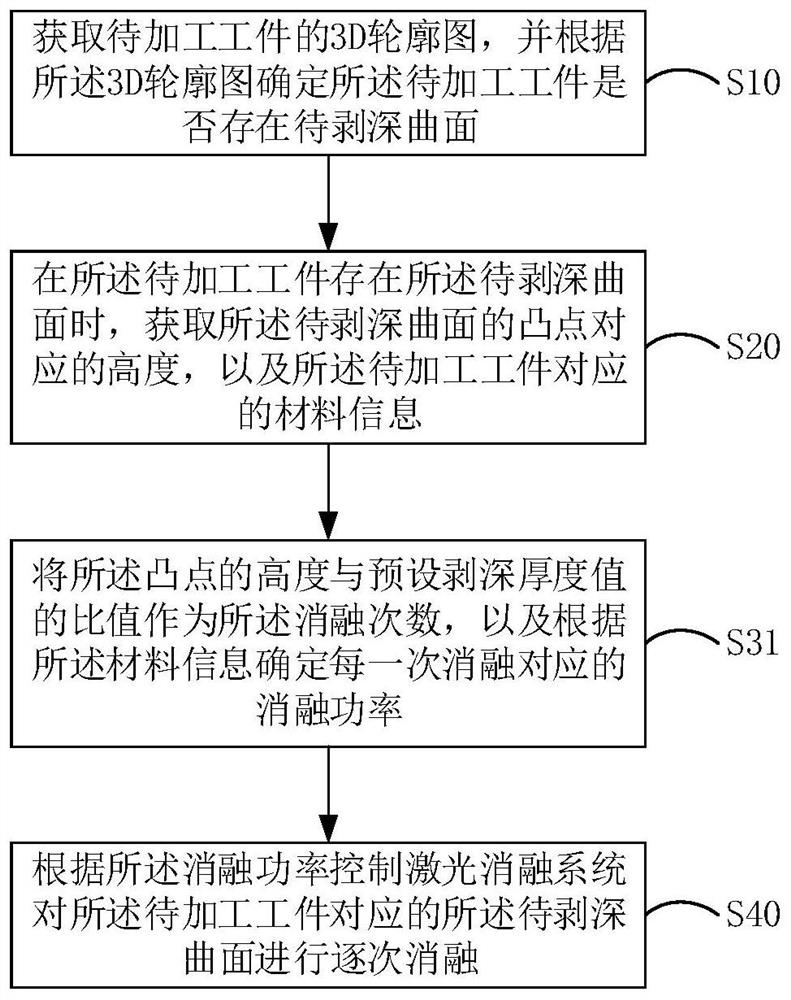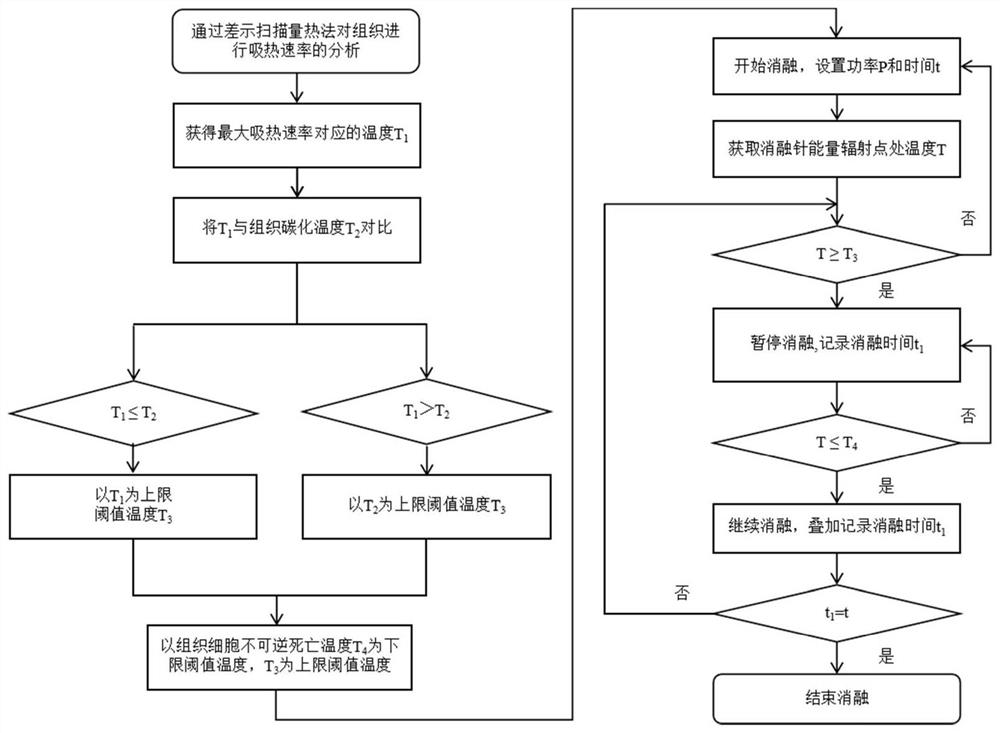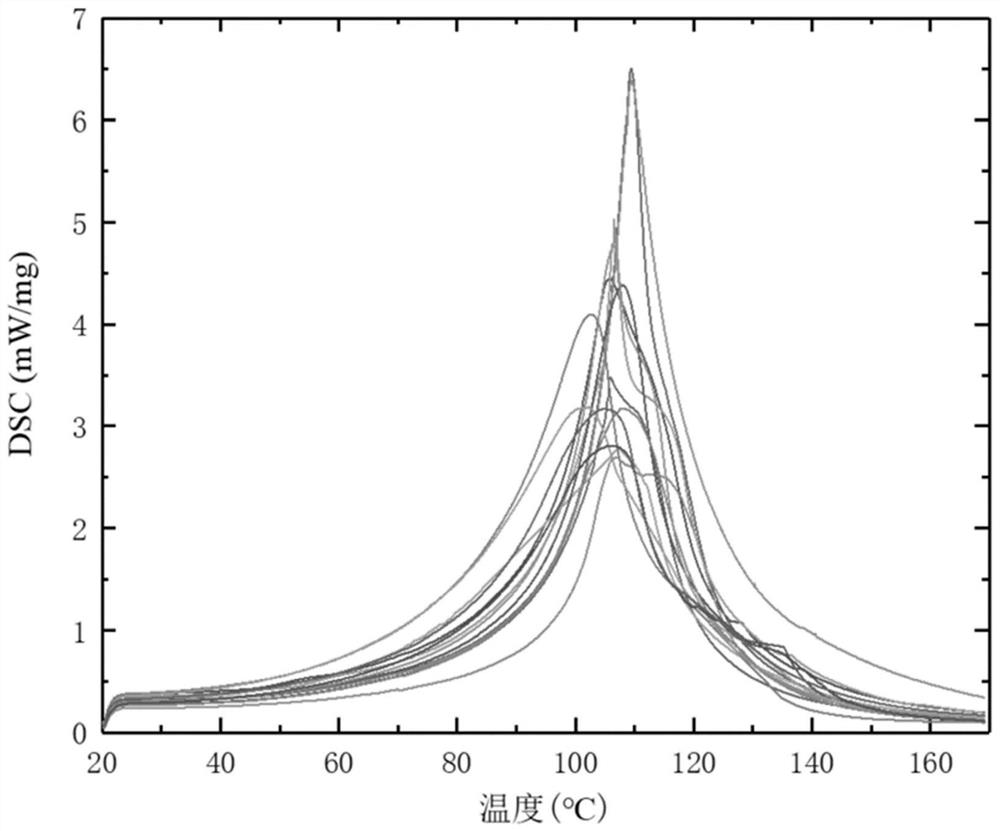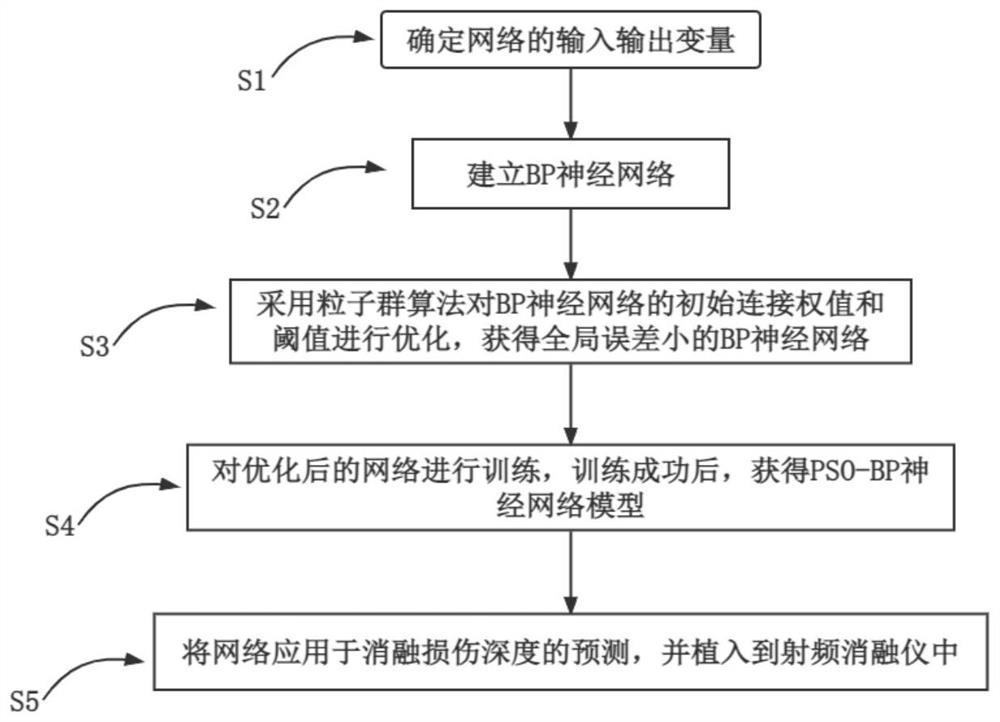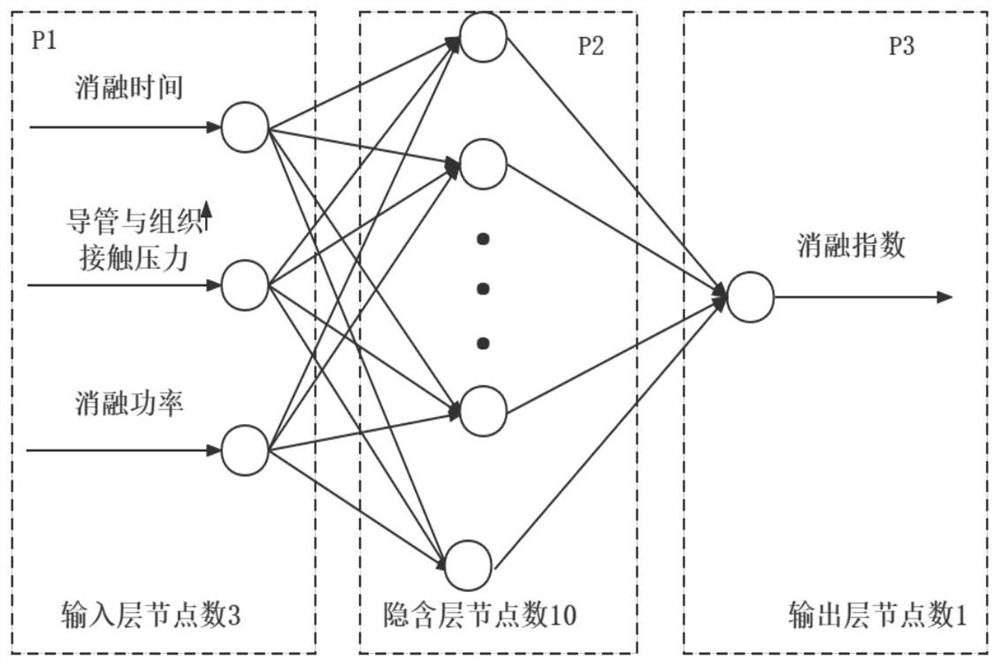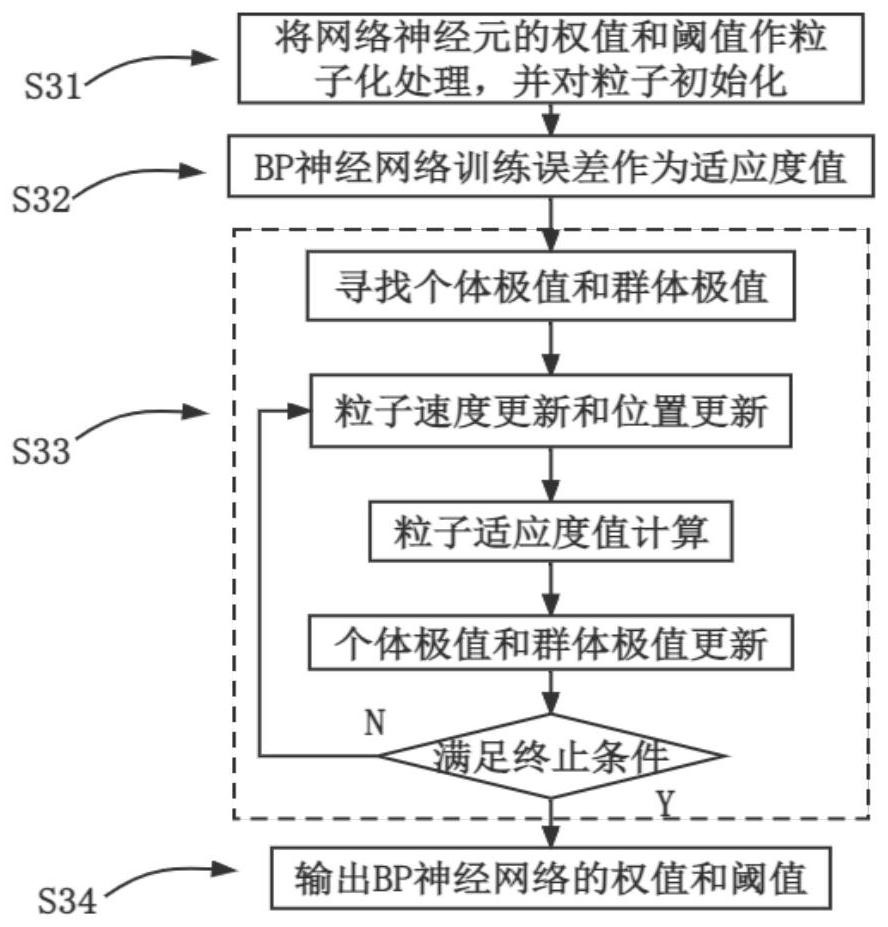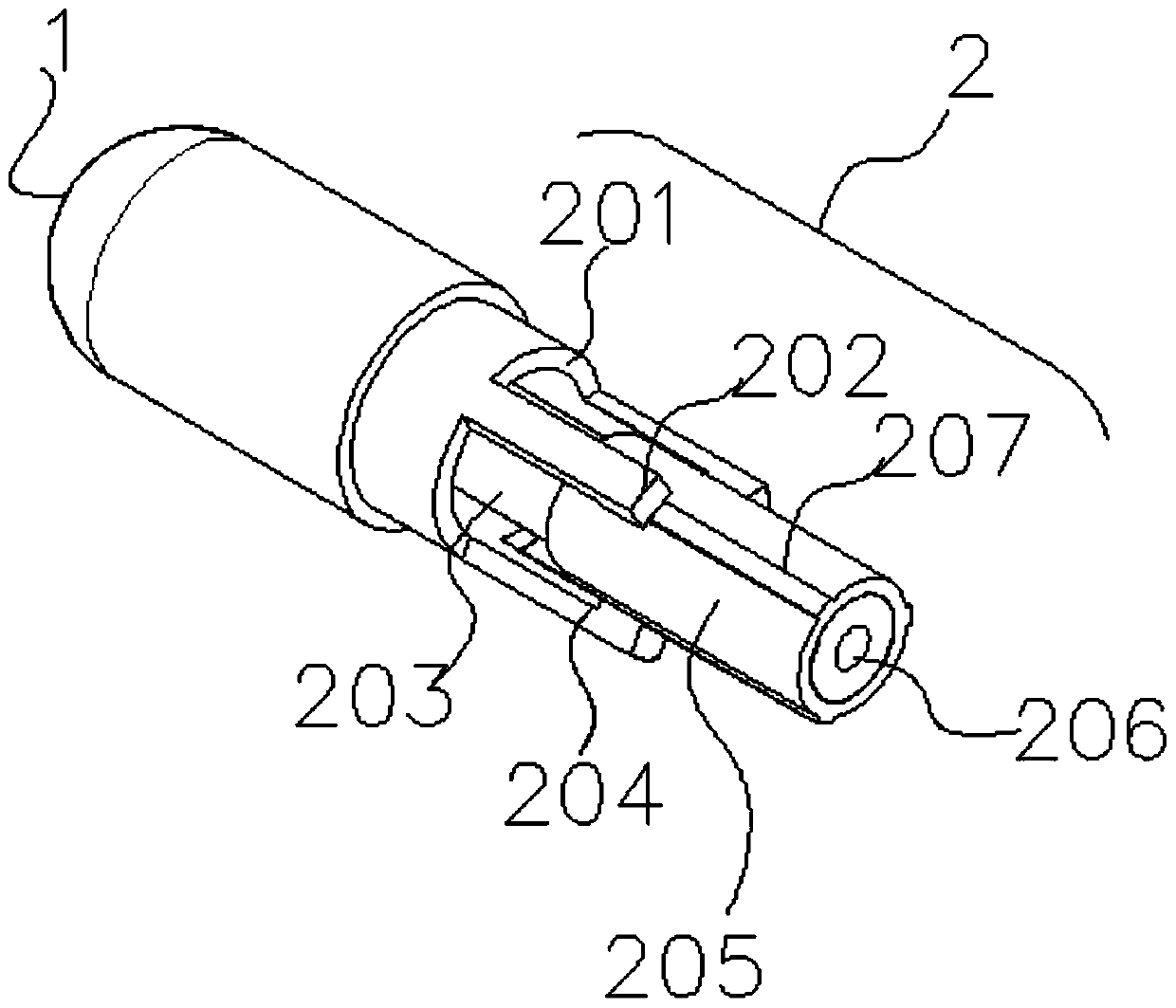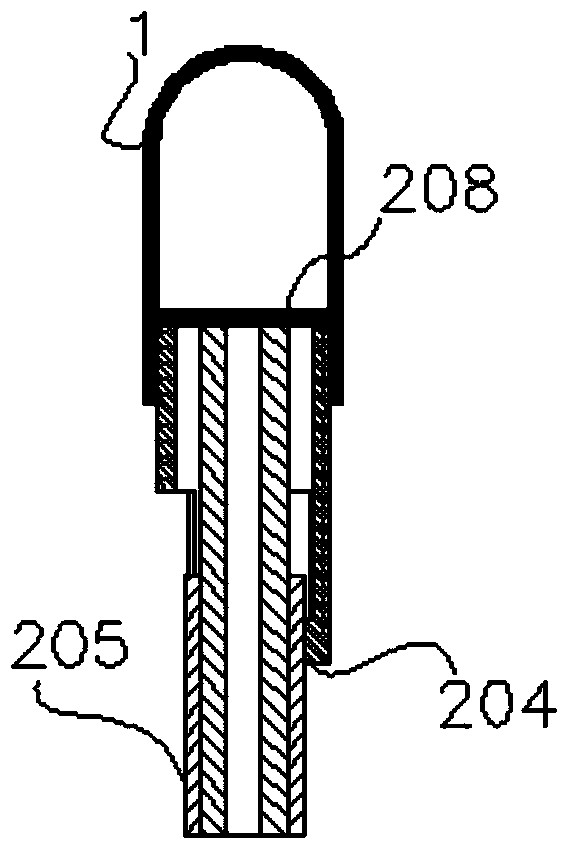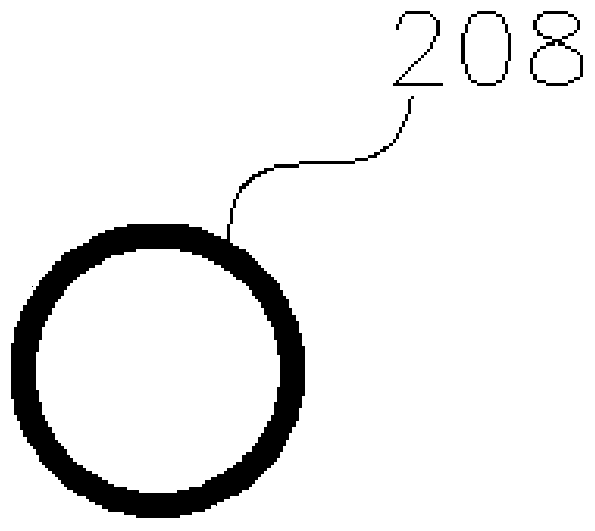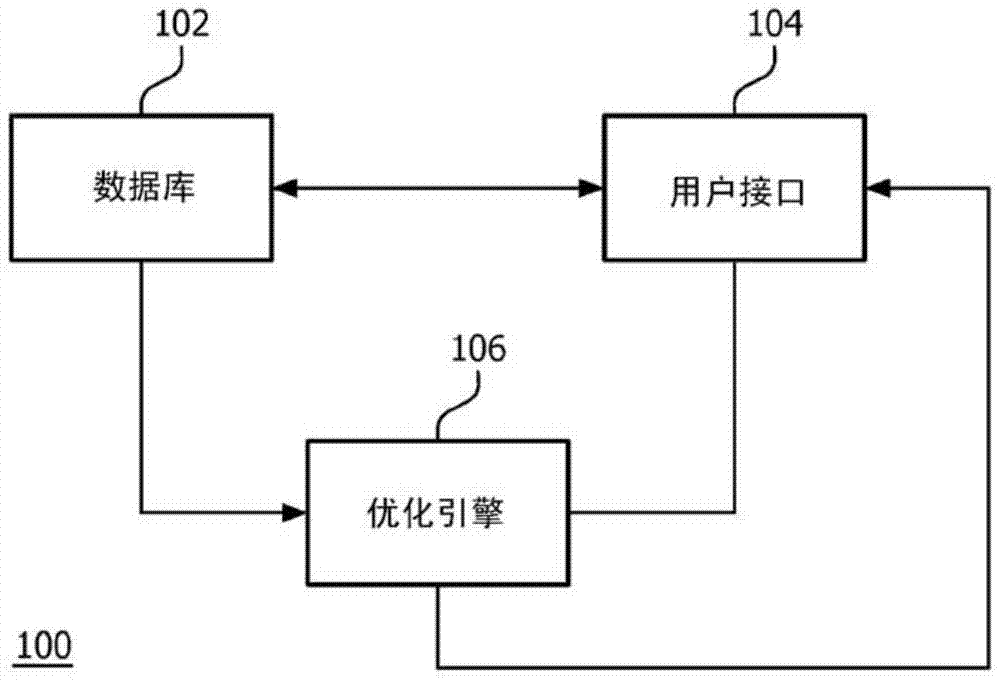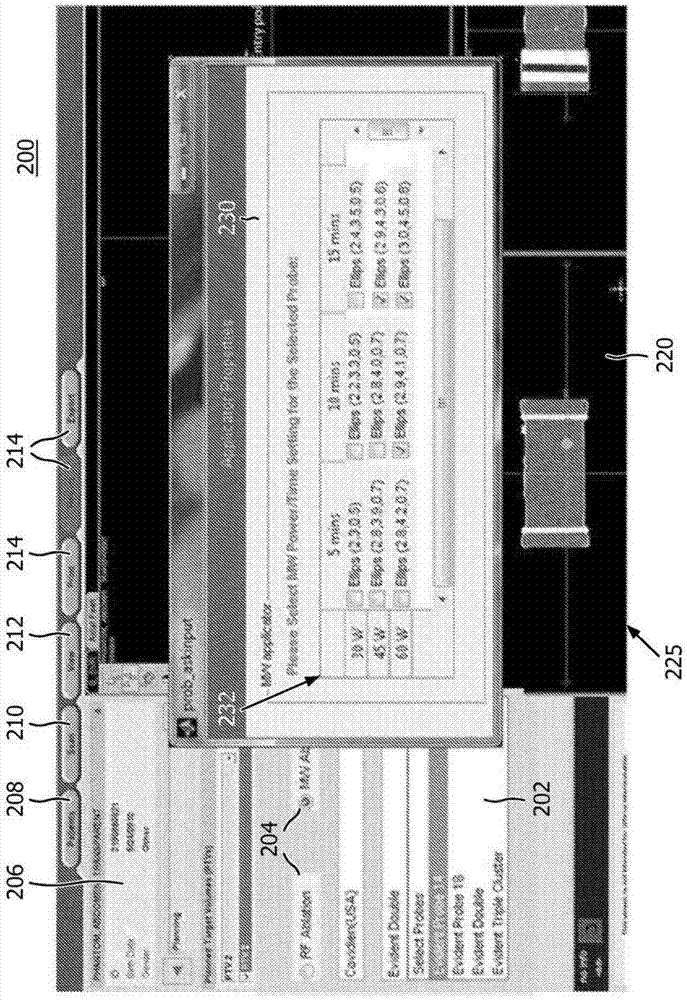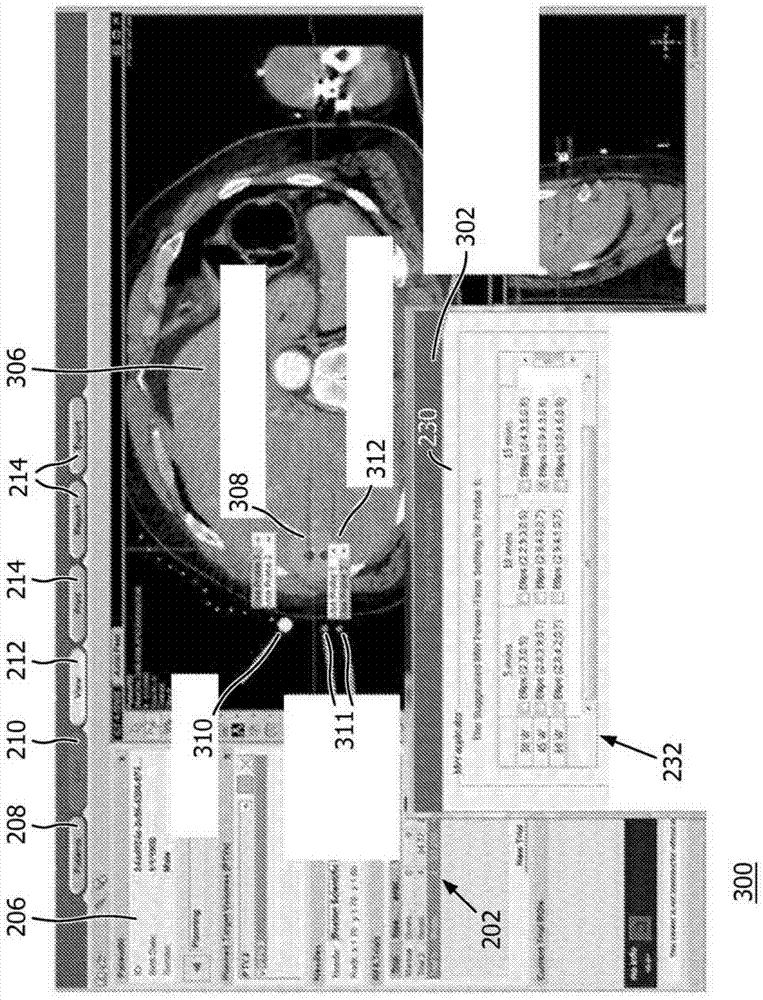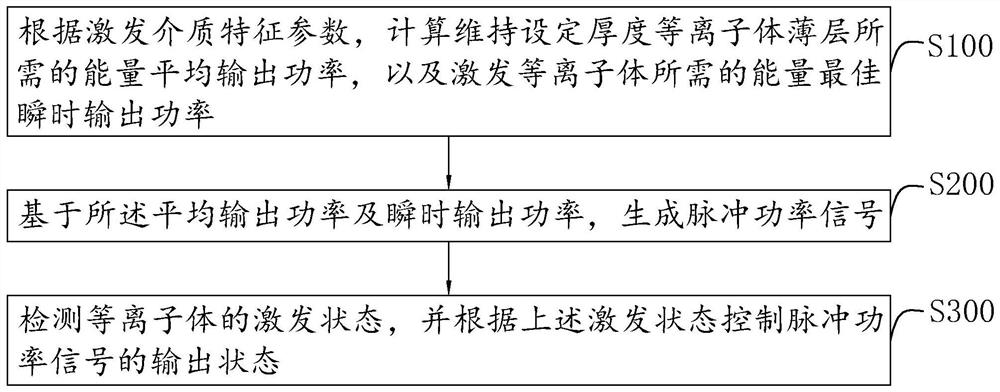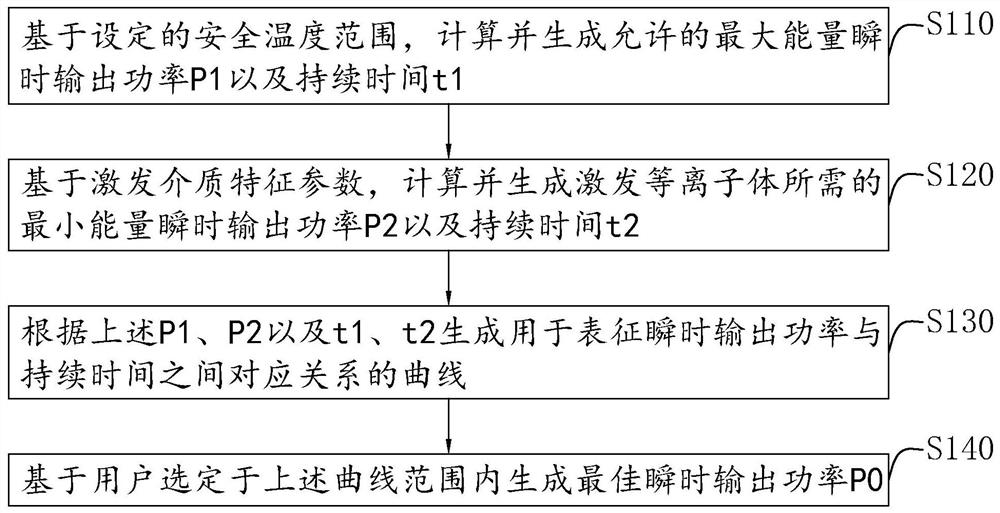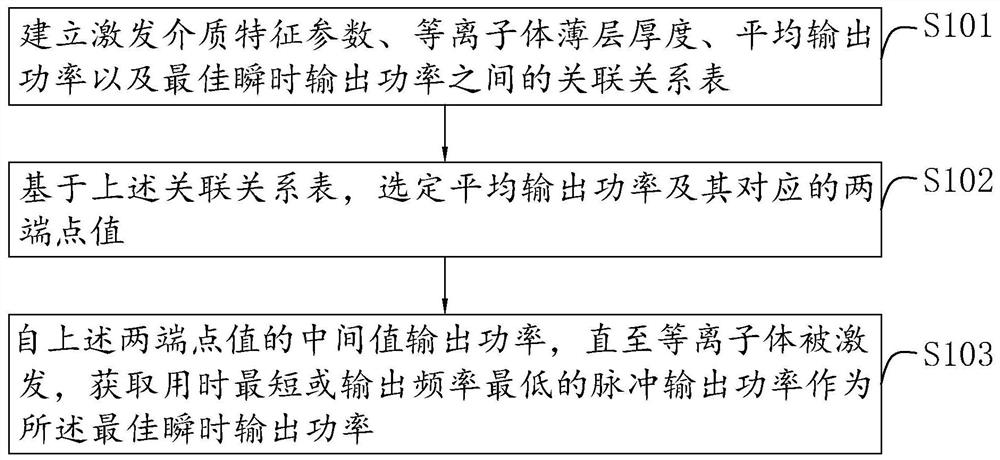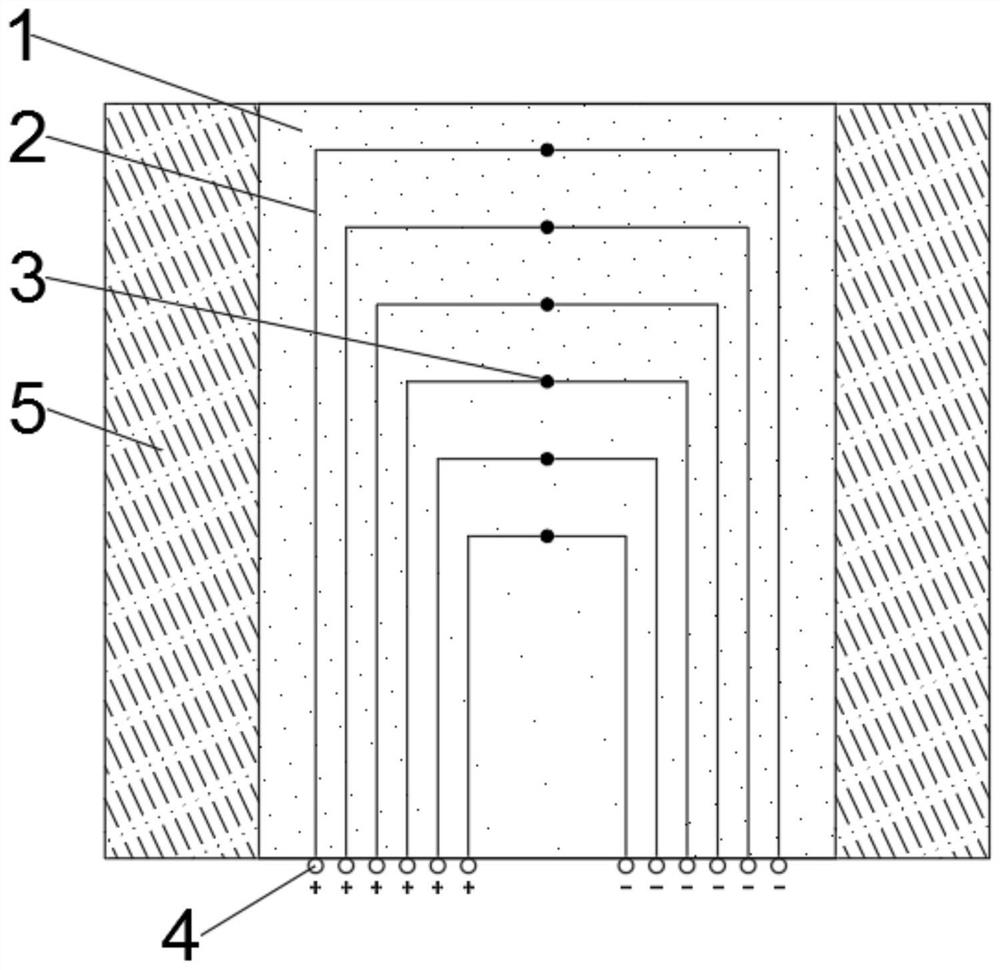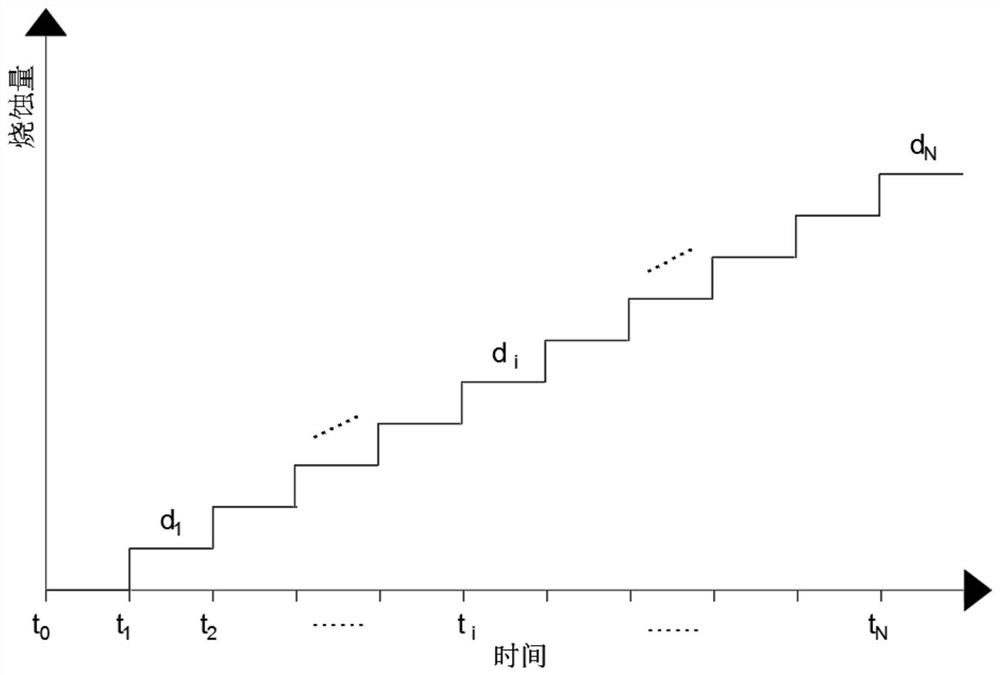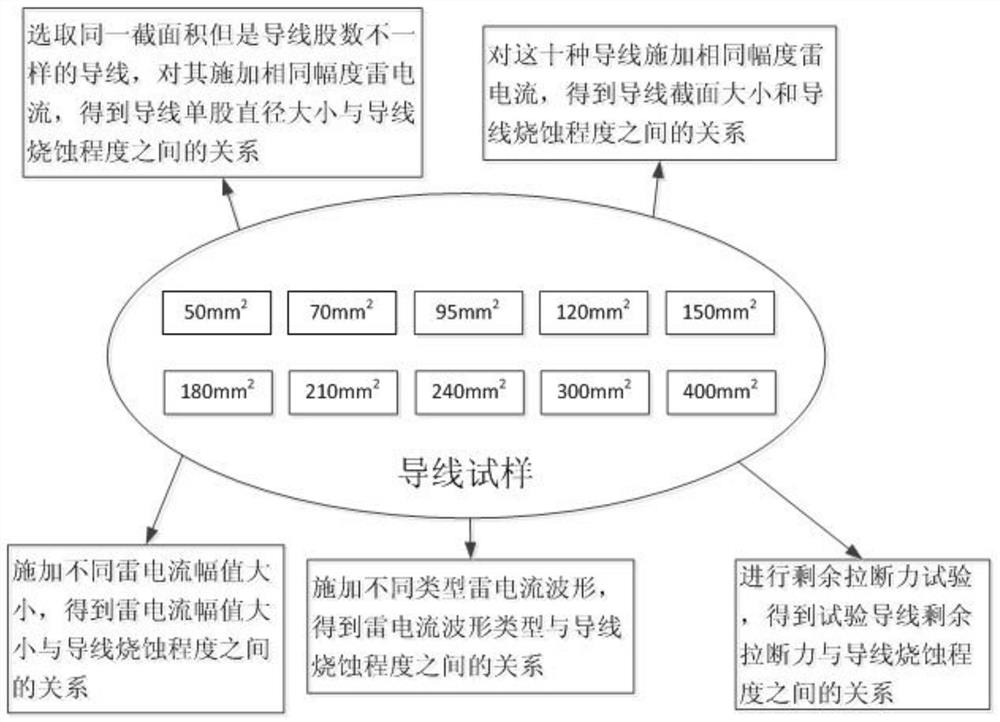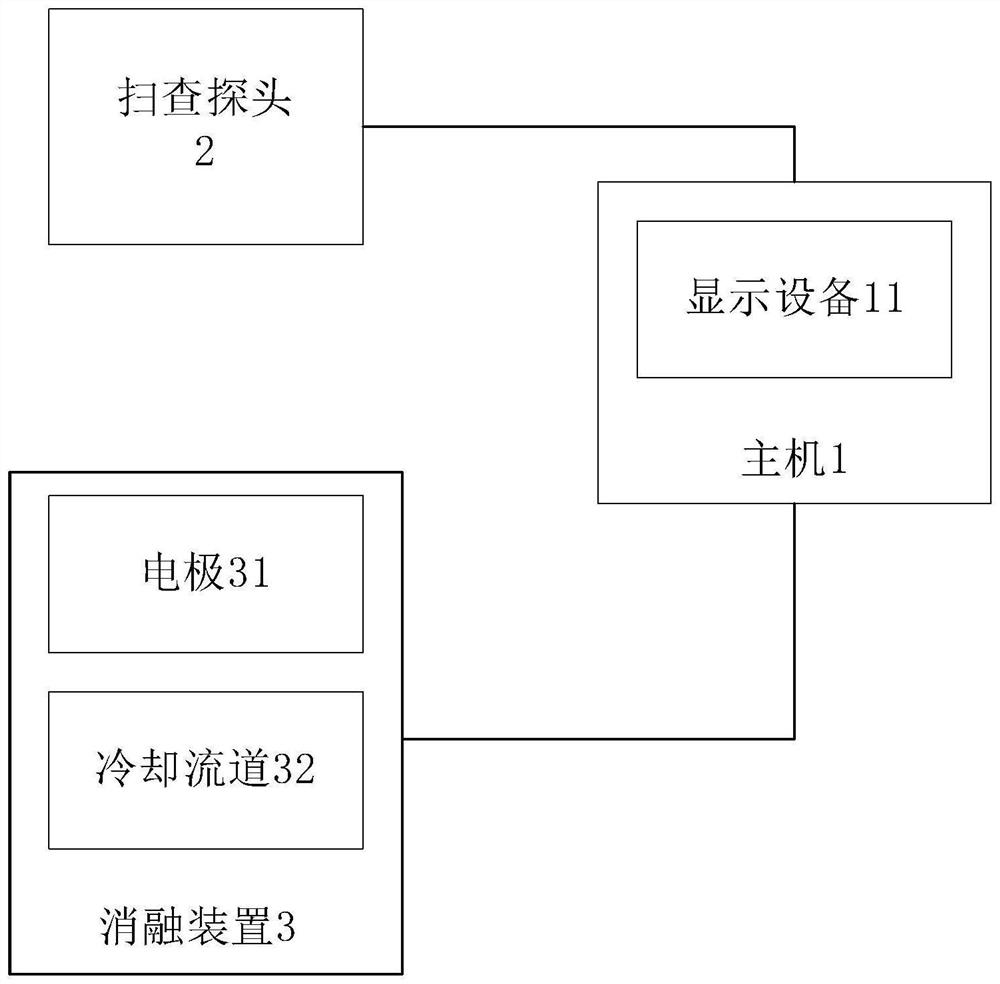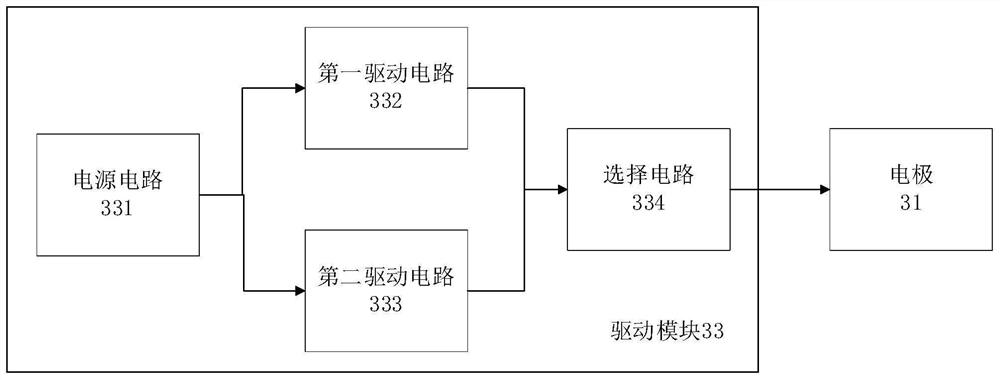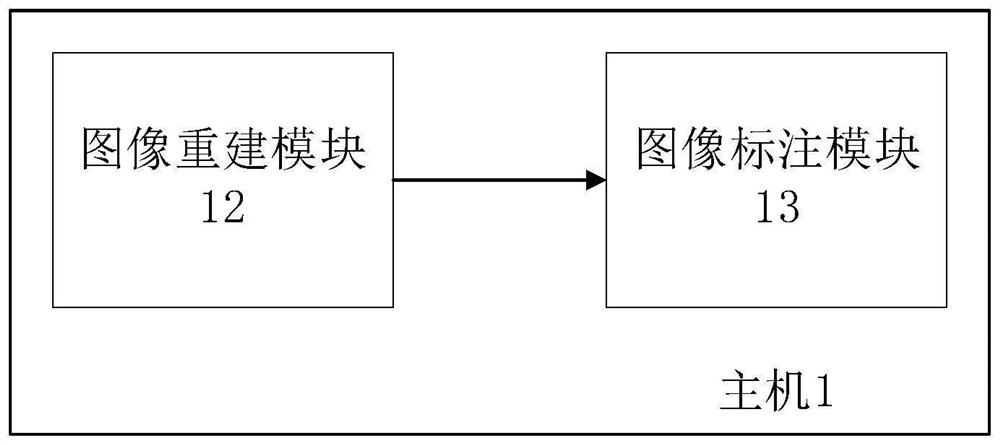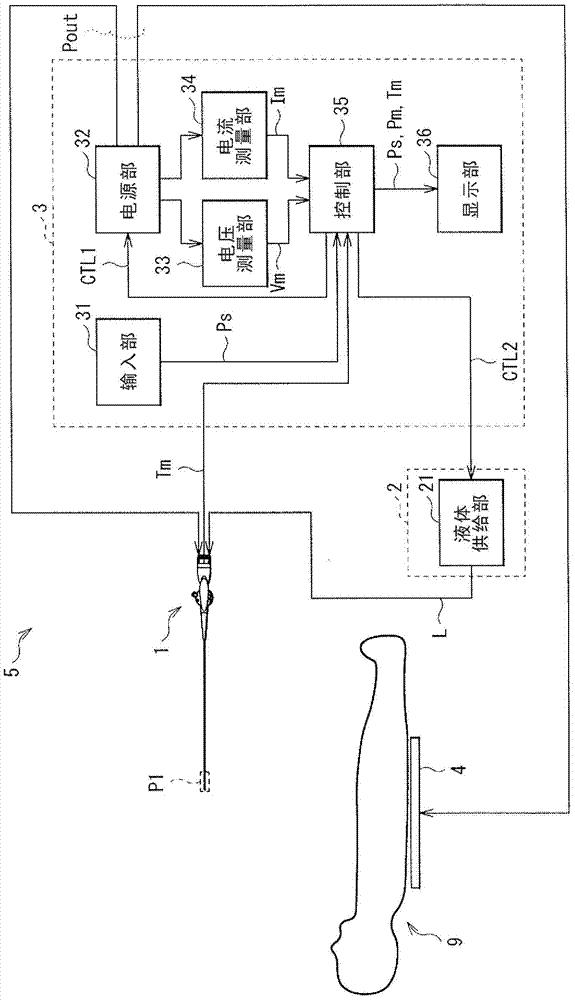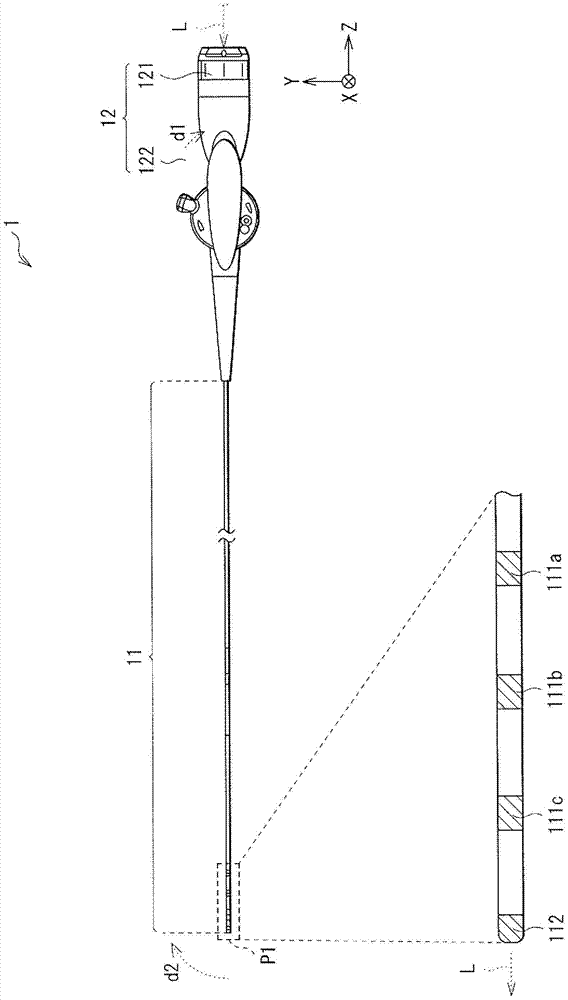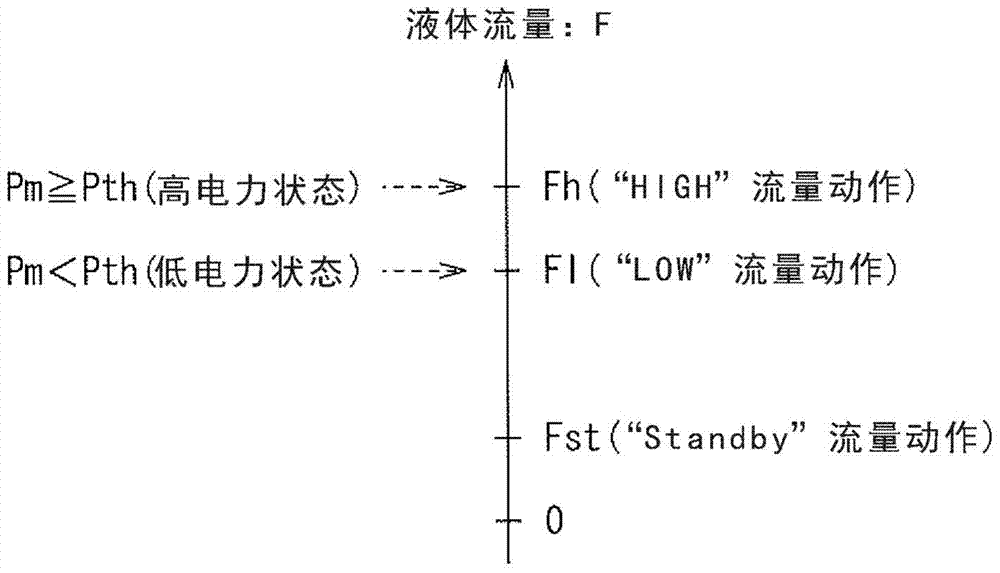Patents
Literature
32 results about "Ablation power" patented technology
Efficacy Topic
Property
Owner
Technical Advancement
Application Domain
Technology Topic
Technology Field Word
Patent Country/Region
Patent Type
Patent Status
Application Year
Inventor
Apparatus and method for cardiac ablation
InactiveUS20050148892A1ElectrocardiographyControlling energy of instrumentVisual perceptionIntracardiac Electrogram
A system and method for cardiac mapping and ablation include a multi-electrode catheter introduced percutaneously into a subject's heart and deployable adjacent to various endocardial sites. The electrodes are connectable to a mapping unit, an ablation power unit a pacing unit, all of which are under computer control. Intracardiac electrogram signals emanated from a tachycardia site of origin are detectable by the electrodes. Their arrival times are processed to generate various visual maps to provide real-time guidance for steering the catheter to the tachycardia site of origin. In another aspect, the system also include a physical imaging system which is capable of providing different imaged physical views of the catheter and the heart. These physical views are incorporated into the various visual maps to provide a more physical representation. Once the electrodes are on top of the tachycardia site of origin, electrical energy is supplied by the ablation power unit to effect ablation.
Owner:DESAI JAWAHAR M
Apparatus And Method For Cardiac Ablation
InactiveUS20070161915A1ElectrocardiographyControlling energy of instrumentVisual perceptionIntracardiac Electrogram
A system and method for cardiac mapping and ablation include a multi-electrode catheter introduced percutaneously into a subject's heart and deployable adjacent to various endocardial sites. The electrodes are connectable to a mapping unit, an ablation power unit a pacing unit, all of which are under computer control. Intracardiac electrogram signals emanated from a tachycardia site of origin are detectable by the electrodes. Their arrival times are processed to generate various visual maps to provide real-time guidance for steering the catheter to the tachycardia site of origin. In another aspect, the system also include a physical imaging system which is capable of providing different imaged physical views of the catheter and the heart. These physical views are incorporated into the various visual maps to provide a more physical representation. Once the electrodes are on top of the tachycardia site of origin, electrical energy is supplied by the ablation power unit to effect ablation.
Owner:CATHEFFECTS
Arrangement and interface for RF ablation system with acoustic feedback
ActiveUS8545409B2Reduce chanceUltrasonic/sonic/infrasonic diagnosticsHealth-index calculationBeam angleRf ablation
A system for ablation with acoustic feedback comprises: a catheter which includes an elongated catheter body; at least one ablation element to ablate a targeted tissue region; and a pulse-echo ultrasonic transducer arranged to emit and receive an acoustic beam along a centroid in a beam direction, at a transducer beam angle of between about 30 degrees and about 60 degrees relative to a distal direction of the longitudinal axis at a location of intersection between the longitudinal axis and the beam direction of the centroid of the acoustic beam of the ultrasonic transducer, wherein the transducer transmits and receives acoustic pulses to provide lesion information in the targeted tissue region; an ablation power subsystem; an ultrasonic transmit and receive subsystem to operate the ultrasonic transducer; a control subsystem to control operation of the ablation power subsystem and the ultrasonic transmit and receive subsystem; and a display.
Owner:ST JUDE MEDICAL
Arrangement and interface for RF ablation system with acoustic feedback
ActiveUS20120265192A1Reduce chanceUltrasonic/sonic/infrasonic diagnosticsHealth-index calculationBeam angleRf ablation
A system for ablation with acoustic feedback comprises: a catheter which includes an elongated catheter body; at least one ablation element to ablate a targeted tissue region; and a pulse-echo ultrasonic transducer arranged to emit and receive an acoustic beam along a centroid in a beam direction, at a transducer beam angle of between about 30 degrees and about 60 degrees relative to a distal direction of the longitudinal axis at a location of intersection between the longitudinal axis and the beam direction of the centroid of the acoustic beam of the ultrasonic transducer, wherein the transducer transmits and receives acoustic pulses to provide lesion information in the targeted tissue region; an ablation power subsystem; an ultrasonic transmit and receive subsystem to operate the ultrasonic transducer; a control subsystem to control operation of the ablation power subsystem and the ultrasonic transmit and receive subsystem; and a display.
Owner:ST JUDE MEDICAL
Output control method and device of radio frequency ablation power, and radio frequency ablation system
PendingCN111214288AGuaranteed continuous outputGood treatment effectSurgical instruments for heatingSleep timeRadio frequency energy
The invention provides an output control method and device of radio frequency ablation power, and a radio frequency ablation system. The output control method of radio frequency ablation power comprises the following steps: when a starting signal is received, controlling a radio frequency energy generator to output a preset ablation power, recording the ablation time and obtaining actual ablationparameters, wherein the actual ablation parameters comprise actual impedance; when the actual impedance meets any one of a first preset condition and a second preset condition, controlling the radio frequency energy generator to stop output of the ablation power, recording the sleep time and stopping recording the ablation time; and if the sleep time exceeds a sleep time threshold value, controlling the radio frequency energy generator to continue to output the ablation power again, and continuing to record the ablation time. The first preset condition is R>K1*Rmin1, and the second preset condition is R>K2*Rmin2. The method can enable the impedance of an ablation part to be in an intermittent stable change state, and continuous output of the radio frequency energy can be ensured, so that radio frequency ablation can be relatively and uniformly carried out in a circulating mode.
Owner:HANGZHOU NUO CHENG MEDICAL INSTR CO LTD
Ablation planning system
An ablation planning system includes a user interface (104) configured to permit selection of inputs for planning an ablation procedure. The user interface is further configured to incorporate selection of ablation probes and one or more combinations of ablation powers, durations or parameters applicable to selected probes in the inputs to size the ablation volumes. The user interface includes a display for rendering internal images of a patient, the display permitting visualizations of the ablation volumes for different entry points on the internal images. An optimization engine (106) is coupled to the user interface to receive the inputs and is configured to output an optimized therapy plan which includes spatial ablation locations and temporal information for ablation so that collateral damage is reduced, coverage area is maximized and critical structures are avoided in a planned target volume.
Owner:KONINKLJIJKE PHILIPS NV
Electrosurgical instrument with selective control of electrode activity
InactiveUS20160051307A1Selective increase and boost in ablative capabilityHigh densitySurgical instruments for aspiration of substancesVolumetric Mass DensitySurgical department
Electrosurgical instruments are configured to provide increased ablative capability without requiring increased current density at the electrode. The electrosurgical instrument includes an elongate probe having a handle portion and a distal end. An electrode is disposed at the distal end and is configured to ablate tissue. The instrument includes an aspiration lumen, e.g., that may open through the electrode, at the distal end to aspirate fluid, tissue debris, and gaseous bubbles through the aspiration lumen. The electrosurgical instrument includes a user operable control (e.g., button) on the handle portion for selectively placing the instrument in boosted ablation mode, which can be achieved by restricting aspiration of fluid through the aspiration lumen, reducing active cooling of the electrode, and causing increased ablative sparking density at the electrode (e.g., by at least 10%, 20%, 35%, or 50%).
Owner:HS WEST INVESTMENTS LLC
Transcatheter interventional atrial septostomy device
PendingCN109965974AGood size controlWon't cause tearingSurgical instruments for heatingShunt DeviceStoma
The present invention discloses a transcatheter interventional atrial septostomy device. The transcatheter interventional atrial septostomy device comprises a catheter body and a radially expandable balloon sleeving and fixed on a distal end of the catheter body; the balloon is provided with a stoma portion for passing through atrial septum and radially expanding to open the atrial septum tissue,and the stoma portion is at least provided with electrode assemblies electrically connected to ablation power sources and control mechanisms along a circumferential direction on an outer surface of the balloon; and the catheter body is axially provided with a guide wire chamber with both ends in a penetrating manner and a filling chamber for filling the balloon. Aiming at defects that in the priorart, tear and damage of heart tissues and stoma retraction after surgery are easily caused and arranged shunt devices lead to embolization, the transcatheter interventional atrial septostomy device is controllable in stoma sizes and free of retraction and does not cause the tear and damage of the heart tissues.
Owner:HANGZHOU NOYA MEDTECH CO LTD
Medical catheter head end capable of measuring contact force
ActiveCN105232141AHigh precisionImprove securitySurgical instruments for heatingCatheterContact force
The invention provides a medical catheter head end capable of measuring contact force. The medical catheter head end comprises an electrode head and a force measuring device, a plurality of blind holes are formed in the electrode head, the force measuring device comprises a plurality of piezoelectric ceramic spring sensors, a base and a plurality of tail lines, and a plurality of through holes are formed in the base. A deformation member and sensors are combined and simplified to be in a two-in-one mode, so that assembly difficult and error are reduced, and accuracy of a force measuring head end is improved. Pressure when the catheter head end contacts with a heart or arterial tissue rich in sympathetic nerve is measured to ensure the pressure to be within a safe range so as to improve safety of high-radio-frequency ablation operation; during the ablation operation, ablation depth can be judged by measuring the pressure when the catheter head end contacts with the tissue, and reliable data support can be provided for doctors to select reasonable ablation power and time.
Owner:LEPU MEDICAL TECH (BEIJING) CO LTD
Ablation simulation method based on data fitting
ActiveCN111027225AReduce distractionsImplement fixesDrawing from basic elementsDesign optimisation/simulationEngineeringComputational physics
The invention discloses an ablation simulation method based on data fitting, and the method comprises the steps: calculating the actual measurement average values of short-diameter and long-diameter data of an ablation boundary under the same ablation power and ablation time, carrying out the thermal field simulation of a target region, and taking the short-diameter data as the reference, and taking the long diameter corresponding to a contour line where a temperature threshold is located as a long-diameter simulation value; under low ablation power, establishing a temperature threshold and ablation power relation model; under high ablation power, establishing a temperature threshold and ablation time relation model and a relation model of the correction coefficient and the ablation power; inputting ablation power and ablation time, selecting a temperature threshold and ablation power relation model or a temperature threshold and ablation time relation model according to the ablationpower to obtain a temperature threshold, obtaining a corresponding ablation simulation image according to the temperature threshold, and correcting the long diameter of the ablation simulation image by utilizing a correction coefficient and ablation power relation model. The method can accurately simulate the ablation boundary.
Owner:NANJING ECO MICROWAVE SYST
Pressure Regulator in Heart chamber
PendingCN109259894APrevent endothelial overlayShorten closing timeAnnuloplasty ringsSurgeryElectricityHeart chamber
The invention discloses a pressure regulator for a heart chamber which comprises a radially contractable and expandable axially penetrating atrial septal passage; a first positioning portion and a second positioning portion respectively abutting against the wall surfaces of both sides of the atrial septum are arranged in the axial direction of the atrial septum passage; at least that first position portion and / or the second positioning portion are provide with an electrically conductive portion abutting against the atrial septum tissue and electrically conducting with the ablation power source, and the electrically conductive portion conduct electricity at least on a surface in contact with the atrial septum tissue. The first positioning portion and / or the second positioning portion are provided with an electrically conductive portion abutting against the atrial septum tissue and electrically conducting with the ablation power source. The invention can prevent the problem that the passage of the atrial septum is closed due to the endothelial creeping of the atrial septum, and avoid the pressure regulating device from losing the function of shunting.
Owner:HANGZHOU NOYA MEDTECH CO LTD
Electrosurgical instrument with selective control of electrode activity
InactiveUS20160051320A1High densityIncrease in sizeInstrument handpiecesSurgical instruments for heatingElectricityActive cooling
Electrosurgical instruments are configured to provide increased ablative capability without requiring increased current density at the electrode. The electrosurgical instrument includes an elongate probe having a handle portion and a distal end. An electrode is disposed at the distal end and is configured to ablate tissue. The instrument includes an aspiration lumen, e.g., that may open through the electrode, at the distal end to aspirate fluid, tissue debris, and gaseous bubbles through the aspiration lumen. The electrosurgical instrument includes a user operable control (e.g., button) on the handle portion for selectively placing the instrument in boosted ablation mode, which can be achieved by restricting aspiration of fluid through the aspiration lumen, reducing active cooling of the electrode, and causing increased ablative sparking density at the electrode (e.g., by at least 10%, 20%, 35%, or 50%).
Owner:HS WEST INVESTMENTS LLC
Electric surgery apparatus and method for controlling electric surgery apparatus
ActiveCN102176875ASurgical instruments for heatingSurgical forcepsHigh frequency powerElectrical impedance
The invention provides an electric surgery apparatus and a method for controlling the electric surgery apparatus. A high-frequency ablation power supply (2) is an electric surgery apparatus for bonding biological tissues. The electric surgery apparatus includes a high-frequency power supplying section for supplying a high-frequency power which is applied to biological tissues, a detecting section for detecting the voltage and current of the high-frequency power outputted from the high-frequency power supplying section, an impedance calculating section for calculating from the voltage and current values detected by the detecting section the impedance between a pair of electrodes (3a) which holds the biological tissues and to which the high-frequency power is supplied, and a control section (18) for controlling the supply and substantial stop of the high-frequency power from the high-frequency power supplying section depending on whether or not the impedance calculated by the impedance calculating section has exceeded a predetermined value twice.
Owner:OLYMPUS CORP
System and method for controlling catheter power based on contact force
The invention provides a system and a method for controlling a catheter power based on a contact force. A method for controlling an ablation power applied to a catheter includes: receiving, by a controller, a detected contact force from a sensor assembly of the catheter, the sensor assembly being configured to detect a contact force applied to the electrode; controlling, by the controller, a power supplied to an electrode of the catheter to have a deactivated power level when the detected contact force is less than a first threshold contact force; controlling, by the controller, the power supplied to the electrode of the catheter to have a first power level when the detected contact force is greater than the first threshold contact force; and controlling, by the controller, the power supplied to the electrode of the catheter to have a deactivated power level when the detected contact force is greater than a cutoff contact force, the cutoff contact force being greater than the first threshold contact force.
Owner:BIOSENSE WEBSTER (ISRAEL) LTD
Medical catheter head end capable of measuring contact force
ActiveCN105147388AImprove securitySimple structure processingSurgical instruments for heatingComputer moduleContact force
The invention provides a medical catheter head end capable of measuring contact force. The medical catheter head end capable of measuring contact force comprises a head end electrode, a force measuring module and a fixed connection piece. The head end electrode and the force measuring module are fixed together through the fixed connection piece. The force measuring module comprises a slider body, a rigid beam and a supporting piece fixedly connected to the rigid beam. A plurality of stretching slider components are arranged on the slider body. The rigid beam is provided with an inner cavity which is through in the axial direction. A plurality of sliding resistors are arranged on the supporting piece. The slider components correspond to the sliding resistors one to one through resistor probes installed at the tail ends of the components. During a radiofrequency operation, the medical catheter head end capable of measuring contact force judges the ablation depth by measuring pressure of the heart making contact with the catheter head end or artery tissue rich in the sympathetic nerve, reliable contact force data supporting is provided for a doctor, the doctor can select reasonable ablation power and time, and it can be guaranteed that safety of the high radiofrequency ablation operation is improved within a safety value range.
Owner:LEPU MEDICAL TECH (BEIJING) CO LTD
Ablation power supply
ActiveUS10869713B2Reduce leakageReduce the required powerDiagnosticsSurgical navigation systemsControl signalElectrical connection
Apparatus, consisting of a power supply having a first electrical connection to a relatively high voltage source and connectable to ablation circuitry in a catheter via a second electrical connection. There are rechargeable first and second subsidiary power sources in the power supply. The apparatus also has a control unit, and a first switch alternately connecting the ablation circuitry to the first and second subsidiary power sources responsively to control signals from the control unit. The apparatus also has a second switch alternately connecting one of the first and second subsidiary power sources to the high voltage source for recharging thereof responsively to the control signals while the one of the first and second subsidiary power sources is disconnected from the ablation circuitry and another of the first and second subsidiary power sources is connected to the ablation circuitry by the first switch.
Owner:BIOSENSE WEBSTER (ISRAEL) LTD
Ablation power control based on contact force
Methods and systems are adapted for ablation of target tissue in a living subject by predicting a lesion size that would result from placing an ablation electrode into contact with the target tissue at a particular contact force while applying energy at a given power level for a particular time interval. The prediction involves modeling the lesion size as a non-linear function of the contact force, the power level and the time interval. The prediction may be iterated by varying the contact force, the power level or the time interval until a saturation point is found, beyond which the lesion size does not increase. After it is established that one of the iterations predicts a desired lesion size, ablation of the target tissue may be conducted using the contact force, the power level and the time interval of the one iteration.
Owner:BIOSENSE WEBSTER (ISRAEL) LTD
Magnetic resonance compatibility radio-frequency ablation apparatus and ablation needle
PendingCN107865688AImprove securityReduce bit error rateDiagnosticsSurgical instruments for heatingRadio frequency energyRadiofrequency ablation device
The invention discloses a magnetic resonance compatibility radio-frequency ablation apparatus and an ablation needle. The ablation apparatus comprises a control module for generating radio-frequency signals, a power module for generating energy, a magnetic compatibility display for conducting display in a magnetic resonance room, a mouse for operating magnetic compatibility and the individual multi-stage ablation needle of compatibility. With the application of the apparatus, by virtue of the mouse and the display, the ablation apparatus can be regulated and controlled by a doctor through a human-computer interaction interface, and magnetic resonance real-time imaging is implemented to judge an ablation process, so that an ablation effect is enhanced and patient's pain is reduced; alternating current is converted into direct current and is supplied; a control board is in charge of controlling output power, and primary filtering is conducted; by virtue of an amplifying plate, the radio-frequency signals are amplified into the radio-frequency energy applicable to ablation; by virtue of a display plate, ablation time, ablation temperature and ablation power are displayed; and the ablation needle is injected with physiological saline in an ablation process, so that an ablation area is improved.
Owner:安徽硕金医疗设备有限公司
Control method and device of laser ablation system and computer readable storage medium
PendingCN114137900AHigh precisionLaser beam welding apparatusNumerical controlPhotoablationProfile diagram
The invention discloses a control method and device of a laser ablation system and a computer readable storage medium, and the method comprises the steps: obtaining a 3D profile diagram of a to-be-processed workpiece, and determining the workpiece information of the to-be-processed workpiece according to the 3D profile diagram, the workpiece information comprises the height and gradient corresponding to the salient point of the to-be-stripped curved surface and the corresponding target position of the salient point in the to-be-processed device; determining ablation power according to the height and the gradient; and performing ablation processing on the target position according to the ablation power. According to the invention, the ablation accuracy of the to-be-processed workpiece is improved.
Owner:泰德激光惠州有限公司
Control method and device of laser ablation system and computer readable storage medium
PendingCN114137901AHigh precisionNumerical controlLaser beam welding apparatusPhotoablationSoftware engineering
The invention discloses a control method and device of a laser ablation system and a computer readable storage medium, and the method comprises the steps: obtaining a 3D profile diagram of a to-be-processed workpiece, and determining whether the to-be-processed workpiece has a to-be-stripped curved surface or not according to the 3D profile diagram; when the to-be-processed workpiece has the to-be-stripped deep curved surface, acquiring the height corresponding to the salient point of the to-be-stripped deep curved surface and the material information corresponding to the to-be-processed workpiece; determining the number of ablation times according to the height, and determining the ablation power corresponding to each ablation according to the material information; and controlling the laser ablation system to perform successive ablation on the curved surface to be deepened corresponding to the workpiece to be processed according to the ablation power. According to the invention, the laser ablation accuracy is improved.
Owner:泰德激光惠州有限公司
Systems and methods for controlling catheter power based on contact force
The present invention is titled "Systems and Methods for Controlling Catheter Power Based on Contact Force." The present invention discloses a method of controlling ablation power applied to a catheter, the method comprising: receiving, by a controller, a detected contact force from a sensor assembly of the catheter, the sensor assembly configured to detect application to the catheter a contact force of an electrode; controlling, by the controller, power applied to an electrode of the catheter to have a deactivated power level when the detected contact force is less than a first threshold contact force; controlling by the controller to provide The power to the electrodes of the catheter is to have a first power level when the detected contact force is greater than the first threshold contact force; and the power provided to the electrodes of the catheter is controlled by the controller to have a first power level when the detected contact force is greater than the first threshold contact force; There is a deactivated power level when the contact force is greater than the cut-off contact force, the cut-off contact force being greater than the first threshold contact force.
Owner:BIOSENSE WEBSTER (ISRAEL) LTD
Microwave ablation and carbonization component regulation and control method based on tissue temperature real-time feedback
PendingCN114224479AImprove postoperative quality of lifeIncrease the axle ratioSurgical instruments using microwavesTreatment targetsEngineering
The invention discloses a microwave ablation and carbonization component regulation and control method based on tissue temperature real-time feedback, which comprises the following steps: S1, analyzing the heat absorption rate of a tissue sample through differential scanning calorimetry to obtain a DSC heat absorption rate curve; s2, acquiring a temperature T1 corresponding to the maximum heat absorption rate according to the heat absorption rate curve, comparing T1 with a tissue carbonization temperature T2, and setting a proper upper limit temperature threshold T3 and a proper lower limit temperature threshold T4; s3, a microwave ablation and real-time temperature monitoring system is built, ablation power P and time t are set, and the temperature T at the energy radiation point of the ablation needle is obtained in real time; s4, if T is larger than or equal to T3, ablating is paused, the ablating time t1 is recorded, if T is smaller than or equal to T4, ablating continues, the ablating time t1 is recorded in an overlapped mode, and ablating is ended until t1 is equal to t. According to the invention, an ablation area is closer to a sphere and is closer to a treatment target pursued by a clinician.
Owner:NANJING UNIV OF AERONAUTICS & ASTRONAUTICS
Method capable of predicting arrhythmia radiofrequency ablation injury depth in real time and radiofrequency ablation instrument
ActiveCN114271927AEasy to controlSurgical instruments for heatingNeural learning methodsNerve networkRf ablation
The invention belongs to the technical field of medical instruments, and particularly relates to a method capable of predicting arrhythmia radiofrequency ablation injury depth in real time and a radiofrequency ablation instrument. According to the method, a particle swarm optimization back propagation (PSO-BP) neural network is adopted to predict the ablation injury depth, and the quantitative relation between three radiofrequency ablation parameters including ablation time, electrode-tissue contact pressure (CF) and ablation power and the ablation injury depth is established through machine learning; the ablation depth index corresponding to the ablation injury depth is obtained from the three radiofrequency ablation parameters. And then the ablation depth index model is transplanted into a radiofrequency ablation instrument, a doctor is assisted to accurately control the ablation depth in the arrhythmia radiofrequency ablation implementation process, and the method has a clinical application prospect.
Owner:FUDAN UNIV +1
A medical catheter tip with measurable contact force
ActiveCN105147388BImprove securitySimple structure processingSurgical instruments for heatingElectrical resistance and conductanceSympathetic nerve
The invention provides a medical catheter head end capable of measuring contact force. The medical catheter head end capable of measuring contact force comprises a head end electrode, a force measuring module and a fixed connection piece. The head end electrode and the force measuring module are fixed together through the fixed connection piece. The force measuring module comprises a slider body, a rigid beam and a supporting piece fixedly connected to the rigid beam. A plurality of stretching slider components are arranged on the slider body. The rigid beam is provided with an inner cavity which is through in the axial direction. A plurality of sliding resistors are arranged on the supporting piece. The slider components correspond to the sliding resistors one to one through resistor probes installed at the tail ends of the components. During a radiofrequency operation, the medical catheter head end capable of measuring contact force judges the ablation depth by measuring pressure of the heart making contact with the catheter head end or artery tissue rich in the sympathetic nerve, reliable contact force data supporting is provided for a doctor, the doctor can select reasonable ablation power and time, and it can be guaranteed that safety of the high radiofrequency ablation operation is improved within a safety value range.
Owner:LEPU MEDICAL TECH (BEIJING) CO LTD
Ablation Planning System
ActiveCN103717167BComputer-aided planning/modellingSurgical instruments using microwavesTemporal informationEntry point
An ablation planning system includes a user interface (104) configured to allow selection of inputs for planning an ablation procedure. The user interface is further configured to include in the input a selection of an ablation probe and one or more combinations of ablation power, duration or parameters applicable to the selected probe to set the size of the ablation volume. The user interface includes a display for presenting an internal image of the patient, the display allowing visualization of the ablation volume for different entry points on the internal image. An optimization engine (106) is coupled to the user interface to receive the input and is configured to output an optimized treatment plan including spatial ablation location and temporal information of ablation to reduce collateral damage, maximize coverage area, and optimize Avoid critical structures in the target volume.
Owner:KONINKLJIJKE PHILIPS NV
Low-temperature plasma ablation power control method and system
PendingCN111938803AEasy to carry outImprove ablation effectSurgical instruments for heatingRadio frequency energyConstant power
The invention discloses a low-temperature plasma ablation power control method and system, and relates to the technical field of ablation medical instruments. The control method comprises the following steps of according to a stimulation medium characteristic parameter, calculating energy average output power required for maintaining a plasma thin layer with the set thickness and energy optimal instantaneous output power required for exciting a plasma; generating a pulse power signal based on the average output power and the instantaneous output power; and detecting the excitation state of theplasma, controlling the output state of a pulse power signal according to the excitation state, and converting the power output mode of a radio frequency energy output unit in a plasma ablation instrument into pulse power output from constant power output. The excitation time of the plasma at the end of an ablation electrode is effectively shortened under the premise of ensuring the safety, and the excitation efficiency is improved. Through pre-parameter storage setting, a user can quickly adjust to obtain appropriate instantaneous output power in the ablation operation process. The method isefficient, convenient and high in reliability.
Owner:上海方润医疗科技股份有限公司
Layering temperature and ablation amount synchronous measurement method and device, and application
PendingCN114001781AAvoid errorsNo circuit breakMeasurement devicesThermal diffusion coefficientMeasurement device
The invention discloses a layering temperature and ablation amount synchronous measurement method and device, and an application, and relates to the technical field of measurement. The invention provides a layering temperature and ablation amount synchronous measurement device which comprises a base body, the base body is installed in an opening formed in a heat-proof layer, the outer surface of the top of the base body is flush with the outer surface of the top of the heat-proof layer, the base body is made of a material with the same or similar thermal diffusion coefficient and ablation resistance as the heat-proof layer, temperature-sensitive elements are arranged at different height positions of the base body, the temperature-sensitive elements are connected with wires, the wires are connected with an external measuring circuit, and the surfaces of the temperature-sensitive elements and the surfaces of the wires are coated with high-temperature-resistant insulating materials used for high-temperature-resistant insulating treatment. According to the invention, the base body and the heat-proof layer have the same heat conduction capability and ablation speed, high-precision synchronous measurement of the ablation amount can be realized, ablation amount measurement and layering temperature measurement are integrated, and errors caused by measurement of the ablation amount and the layering temperature in two times by a measurement device are avoided.
Owner:北京千河空间科技有限公司
A method for evaluating the lightning current ablation resistance ability of transmission line conductor and ground wire
The invention discloses a method for evaluating the lightning current ablation ability of a grounding wire in a transmission line. The method comprises: by testing the relationship between the cross-section size of different wires, the diameter of a single strand of a wire, the magnitude of a lightning current, the type of a lightning current waveform, and the residual breaking force, respectively, and the lightning current ablation ability of a grounding wire in a transmission line , obtaining quantitative evaluation data of 5 aspects, comprehensively evaluating the lightning current ablationability of the grounding wire in the transmission line , and providing technical support for the lightning-proof selection of the grounding wire in the transmission line, therefore ensuring the safeand stable operation of the power grid.
Owner:GUIZHOU POWER GRID CO LTD
Ablation treatment equipment
PendingCN114209419AImprove reliabilityReal-time displayOrgan movement/changes detectionInfrasonic diagnosticsRf ablationTherapeutic Devices
The invention relates to the technical field of ablation treatment, in particular to ablation treatment equipment which comprises at least one scanning probe connected with a host, and the scanning probe emits ultrasonic waves to a patient and collects echo data from the patient under the control of the host; the host receives echo data returned by the self-scanning probe and generates an ultrasonic image according to the echo data; the display device displays the ultrasonic image; the at least one ablation device is connected with the host, and the ablation device emits ablation energy to the patient under the control of the host to complete treatment. Compared with the prior art, the method has the advantages that the ultrasonic image device is added into the ablation treatment device, real-time display of the current treatment progress is achieved, a doctor is reminded to adaptively select a microwave ablation mode or a radio frequency ablation mode according to a treatment target, the ablation power and the ablation time are controlled, the operation efficiency is effectively improved, and the operation cost is reduced. And the reliability of ablation treatment is improved.
Owner:RUIJIN HOSPITAL AFFILIATED TO SHANGHAI JIAO TONG UNIV SCHOOL OF MEDICINE
catheter system
InactiveCN104822335BAvoid the understatementProper perfusion actionSurgical instruments for heatingMedicinePerfusion
The present invention provides a catheter system that allows proper perfusion maneuvers. The catheter system 5 includes an ablation catheter 1 having an irrigation mechanism, a power supply unit 32 for supplying power for ablation to the ablation catheter 1 , a liquid supply unit 21 for supplying an irrigation liquid to the ablation catheter 1 , and a control unit 35 . When the actual measured power Pm during ablation is in a high power state equal to or greater than the threshold power Pth, the control unit 35 controls a large flow rate operation; traffic action. In addition, when switching from a low power state to a high power state, the small flow rate operation is quickly switched to a large flow rate operation; on the other hand, when switching from a high power state to a low power state, the low power state continues during the transition. In the case of the first standby time, the high flow rate operation is switched to the low flow rate operation after the first standby time is maintained.
Owner:JAPAN LIFELINE CO LTD
Features
- R&D
- Intellectual Property
- Life Sciences
- Materials
- Tech Scout
Why Patsnap Eureka
- Unparalleled Data Quality
- Higher Quality Content
- 60% Fewer Hallucinations
Social media
Patsnap Eureka Blog
Learn More Browse by: Latest US Patents, China's latest patents, Technical Efficacy Thesaurus, Application Domain, Technology Topic, Popular Technical Reports.
© 2025 PatSnap. All rights reserved.Legal|Privacy policy|Modern Slavery Act Transparency Statement|Sitemap|About US| Contact US: help@patsnap.com
